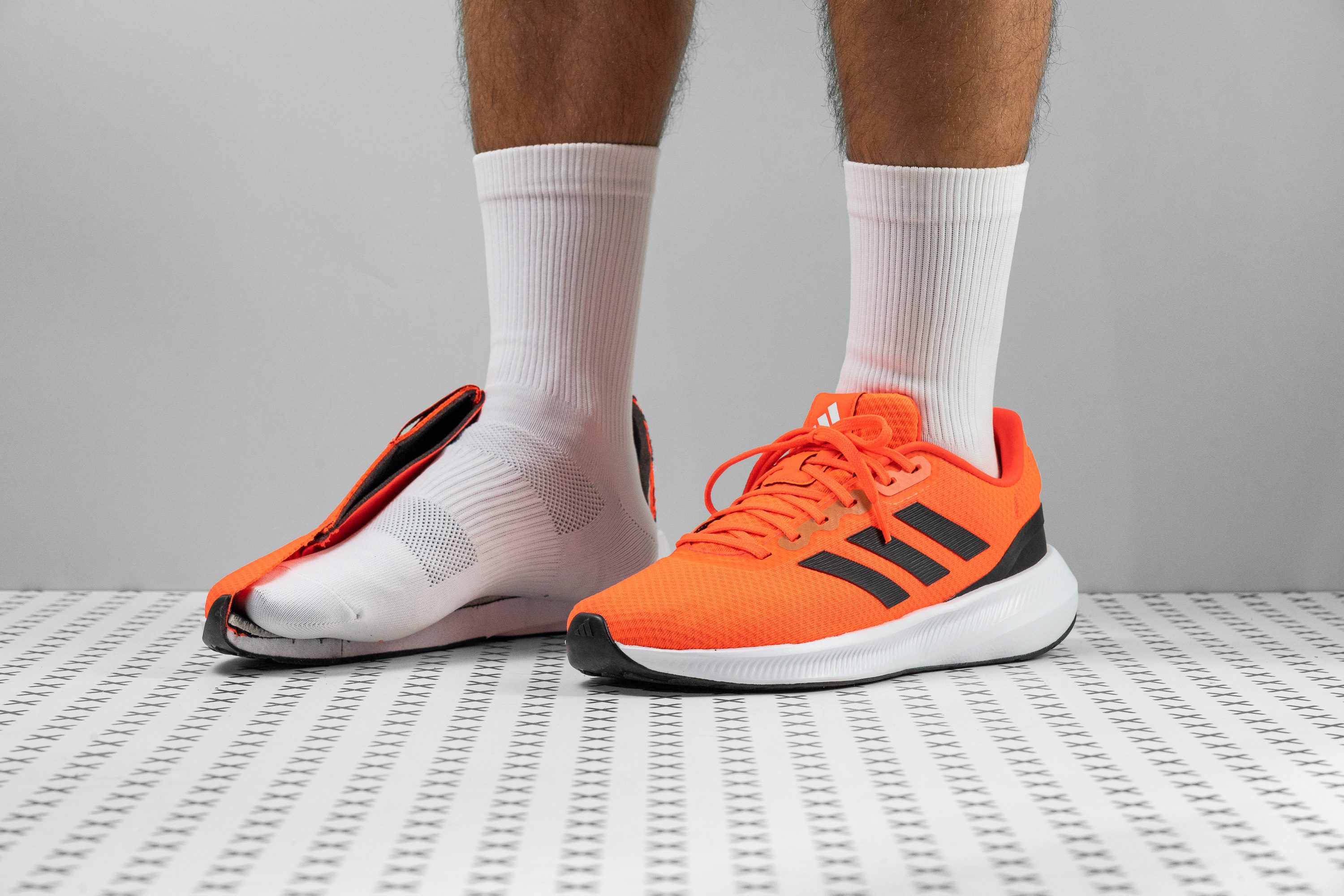Our verdict
- Top pick in best running shoes with a wide toebox (2023)
Pros
- Continues to provide exceptional value at only $65
- Incredibly durable outsole
- Accommodates wide feet comfortably
- Offers a flexible ride
- Budget-friendly
- Versatile enough to serve as a gym shoe
- Provides substantial comfort for heel strikers
- More cushion than previous versions
Cons
- Lacks cushioning in the forefoot area
- Weighs more than v1 and v2
- The upper is not durable at all
Audience verdict
Comparison
The most similar running shoes compared
+ + Add a shoe | |||||
|---|---|---|---|---|---|
| Audience score | 81 Good! | 85 Good! | 82 Good! | 84 Good! | |
| Price | $65 | $65 | $80 | $75 | |
| Pace | Daily running | Daily running | Daily running | Daily running | |
| Shock absorption | - | Moderate | Low | - | |
| Energy return | - | Low | Low | - | |
| Traction | - | Low | Low | - | |
| Arch support | Neutral | Neutral | Neutral | Neutral | |
| Weight lab Weight brand | 10 oz / 283g 9.7 oz / 275g | 9.7 oz / 275g 10.7 oz / 303g | 11.5 oz / 326g 12.1 oz / 343g | 11.2 oz / 318g 10.1 oz / 285g | |
| Drop lab Drop brand | 13.6 mm 9.0 mm | 9.4 mm 10.0 mm | 11.3 mm 9.0 mm | 12.9 mm 8.0 mm | |
| Strike pattern | Heel | HeelMid/forefoot | Heel | Heel | |
| Size | True to size | True to size | True to size | True to size | |
| Midsole softness | Balanced | Balanced | Balanced | Balanced | |
| Difference in midsole softness in cold | Small | Small | Normal | Normal | |
| Toebox durability | Bad | Bad | Decent | Bad | |
| Heel padding durability | Bad | Bad | Decent | Bad | |
| Outsole durability | Good | Decent | Decent | Decent | |
| Breathability | Moderate | Moderate | Breathable | Moderate | |
| Width / fit | Medium | Wide | Medium | Medium | |
| Toebox width | Wide | Medium | Medium | Medium | |
| Stiffness | Stiff | Moderate | Moderate | Moderate | |
| Torsional rigidity | Moderate | Flexible | Moderate | Moderate | |
| Heel counter stiffness | Flexible | Moderate | Flexible | Flexible | |
| Heel lab Heel brand | 31.6 mm 25.0 mm | 31.2 mm 33.0 mm | 30.3 mm 25.0 mm | 31.9 mm 34.0 mm | |
| Forefoot lab Forefoot brand | 18.0 mm 16.0 mm | 21.8 mm 23.0 mm | 19.0 mm 16.0 mm | 19.0 mm 26.0 mm | |
| Widths available | NormalWide | NormalWide | NormalWide | NormalWide | |
| Orthotic friendly | ✓ | ✓ | ✓ | ✓ | |
| Season | All seasons | All seasons | SummerAll seasons | All seasons | |
| Removable insole | ✓ | ✓ | ✓ | ✓ | |
| Ranking | #566 Bottom 17% | #202 Bottom 47% | #289 Bottom 24% | #242 Bottom 36% | |
| Popularity | #614 Bottom 10% | #113 Top 30% | #191 Top 50% | #325 Bottom 15% |
Who should buy
In our opinion, the Adidas Runfalcon 3 shines as a stellar pick for:
- Heel strikers seeking a budget-friendly shoe that does well on easy and moderate runs.
- Those needing a value-oriented, versatile shoe suitable for walking, running, and even casual wear.
- Fans of earlier Adidas Runfalcon models looking for an enhanced yet familiar experience.
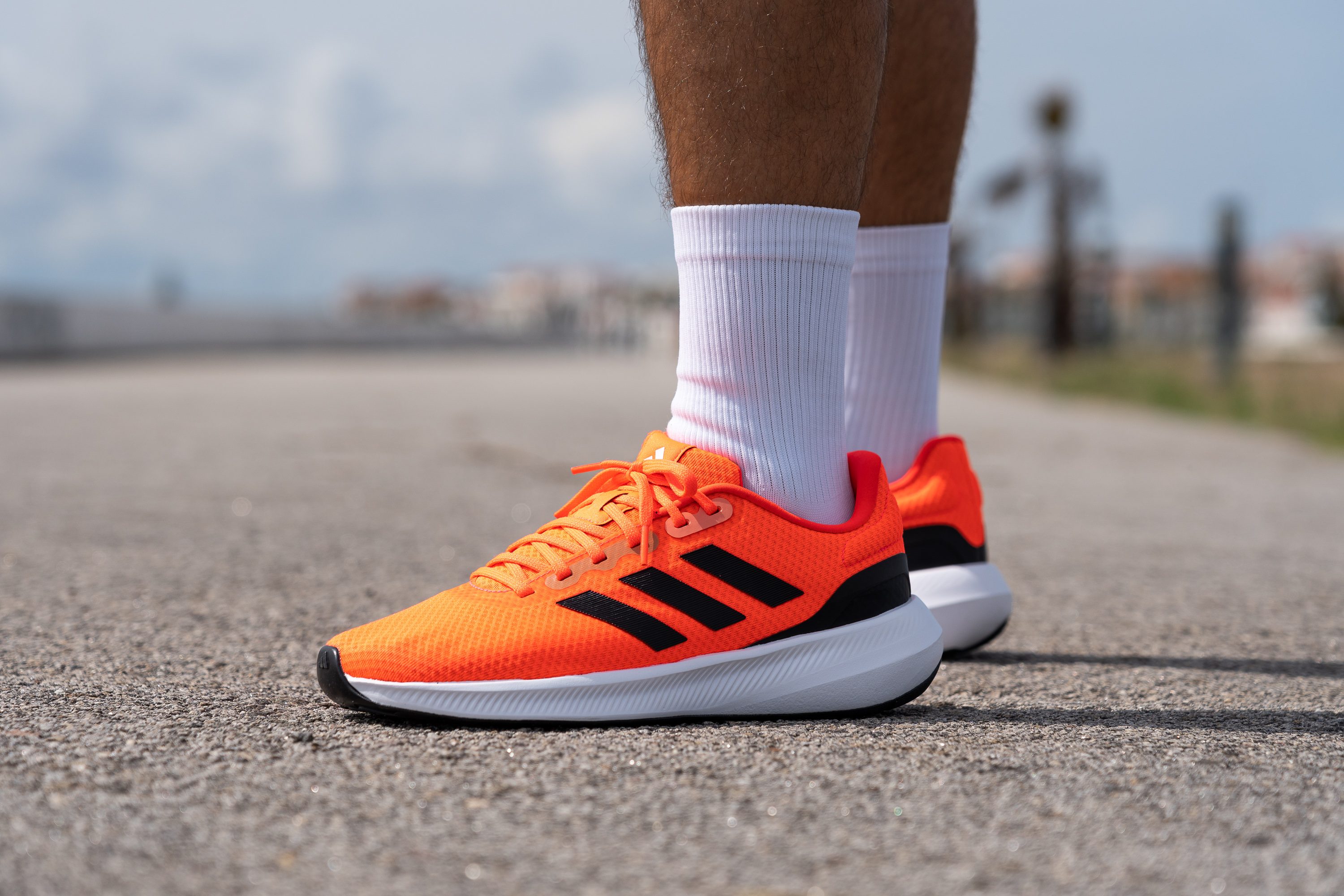
Who should NOT buy
This running shoe presents an exceptional value for its price, yet it won't suit everyone. In our tests, we found its midsole might not deliver enough cushioning or stack height for those who strike with their forefoot or midfoot.
Moreover, we think the midsole could benefit from a touch more bounce, but this is a common trait in any budget-friendly shoe. These particular aspects may discourage long-distance runners and those seeking a shoe for fast pacing from selecting this model.
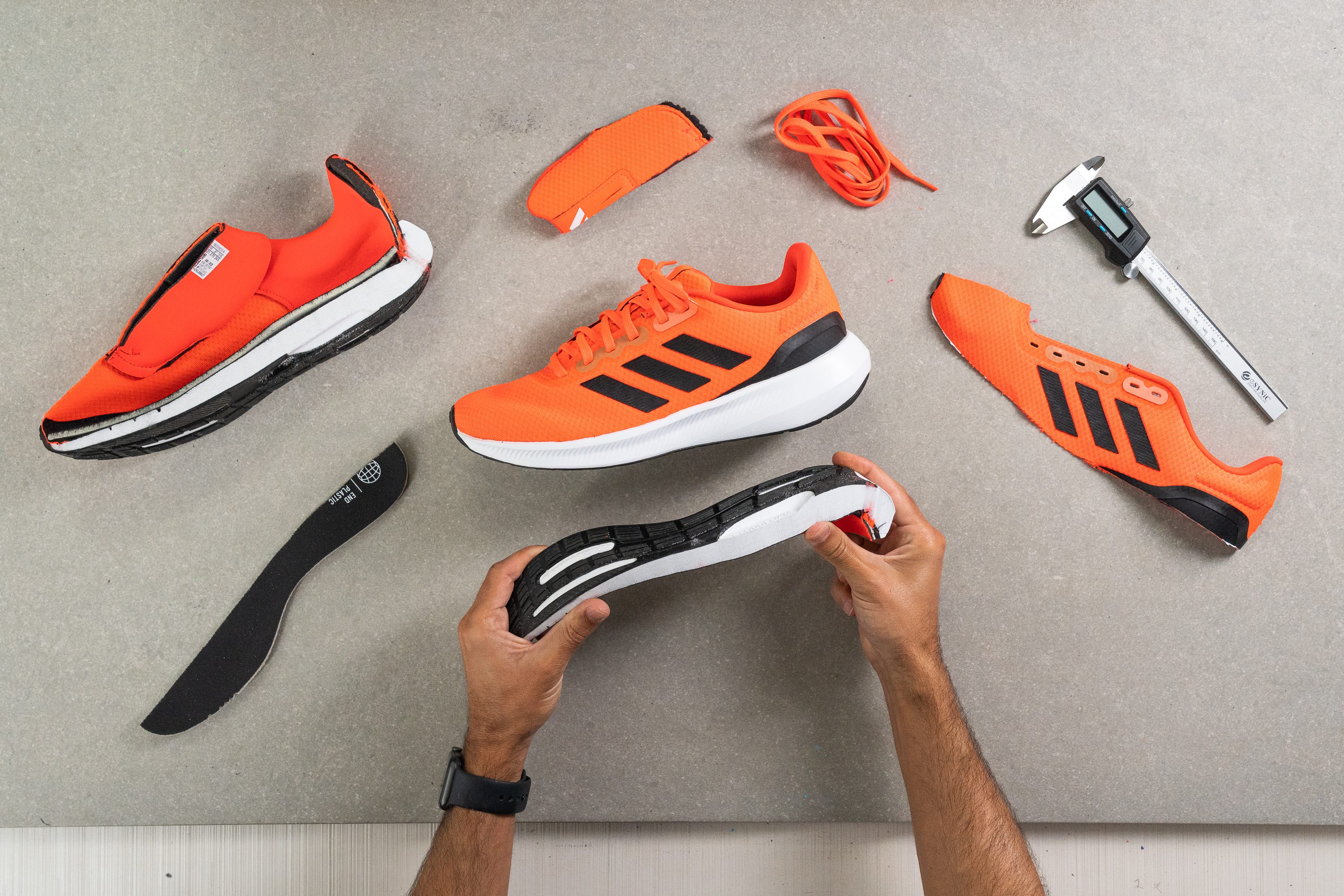
Cushioning
Heel stack
We've noted the increase in the weight of the Runfalcon 3 compared to its predecessors.
The heel of the Runfalcon has been steadily growing. It started from 26.5 mm (v1), moved up to 28.7 mm (v2), and now, it has crossed the 30 mm mark to rest at 31.6 mm in the version 3.
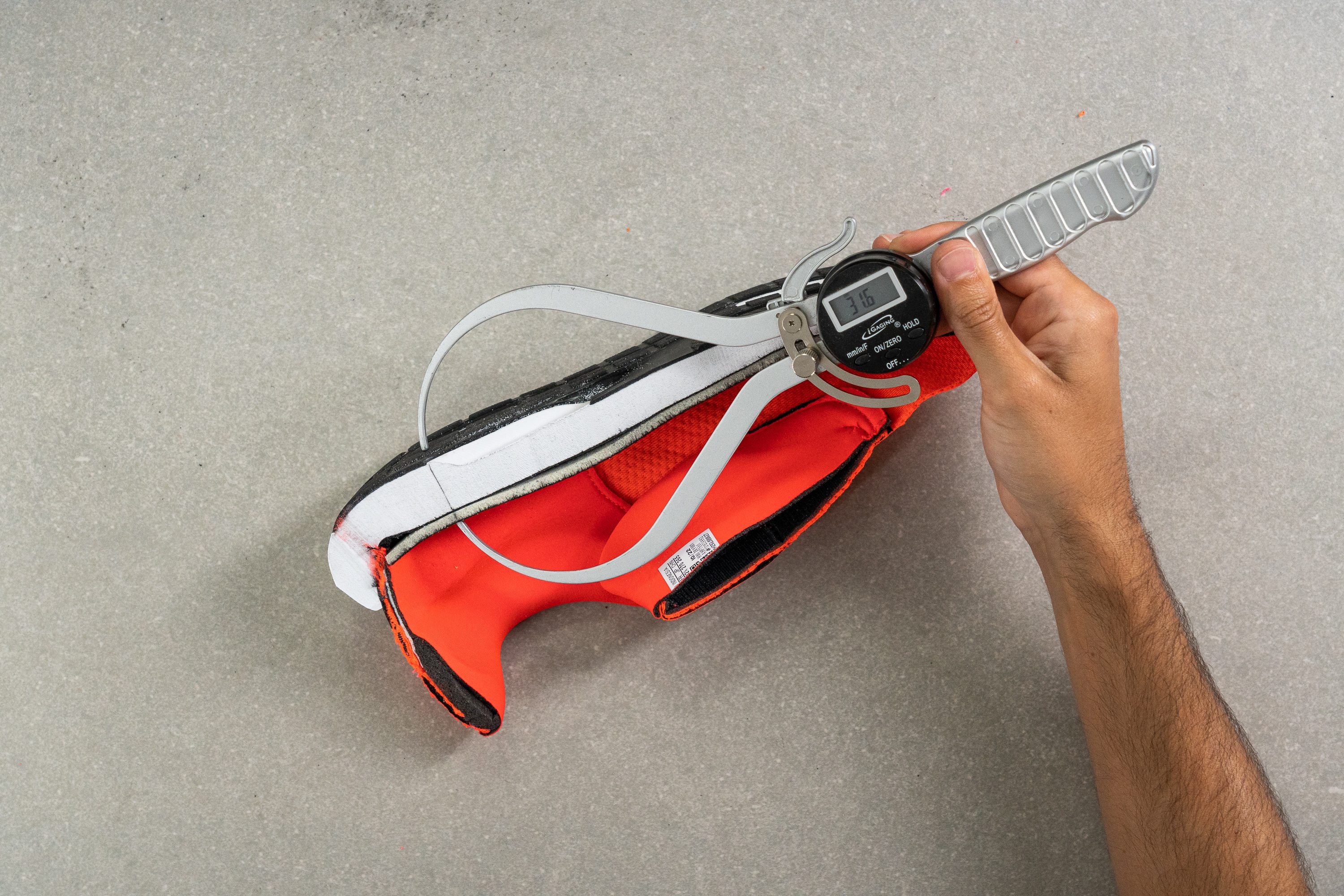
| Runfalcon 3 | 31.6 mm |
| Average | 34.8 mm |
Forefoot stack
The forefoot has also seen growth, but to a much lesser extent. Standing at 18.0 mm, it's only 0.4 mm higher than the first version and 0.2 mm taller than the second. It's clear that the shoe's cushioning is still lacking, and it's not designed with forefoot or midfoot strikers in mind.
For those in search of a budget-friendly shoe that offers more cushioning in the forefoot, we suggest considering the Saucony Axon 2.
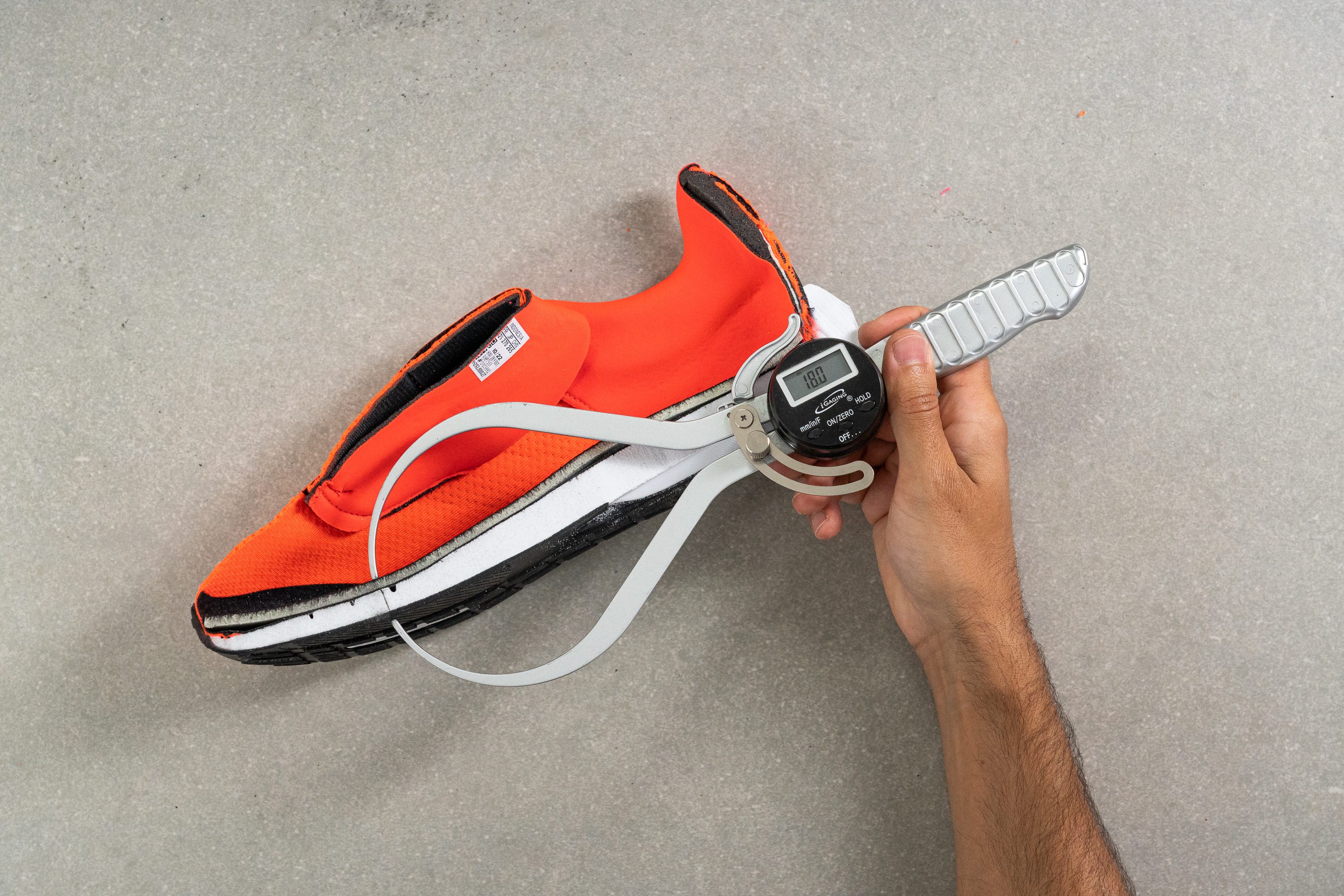
| Runfalcon 3 | 18.0 mm |
| Average | 26.2 mm |
Drop
Surely, a hefty heel-cushion and the shortage in the forefoot leads to a steeeep heel-to-toe drop.
In our measurements, it stands at a staggering 13.6 mm, which significantly differs Adidas's official claim of 9 mm.
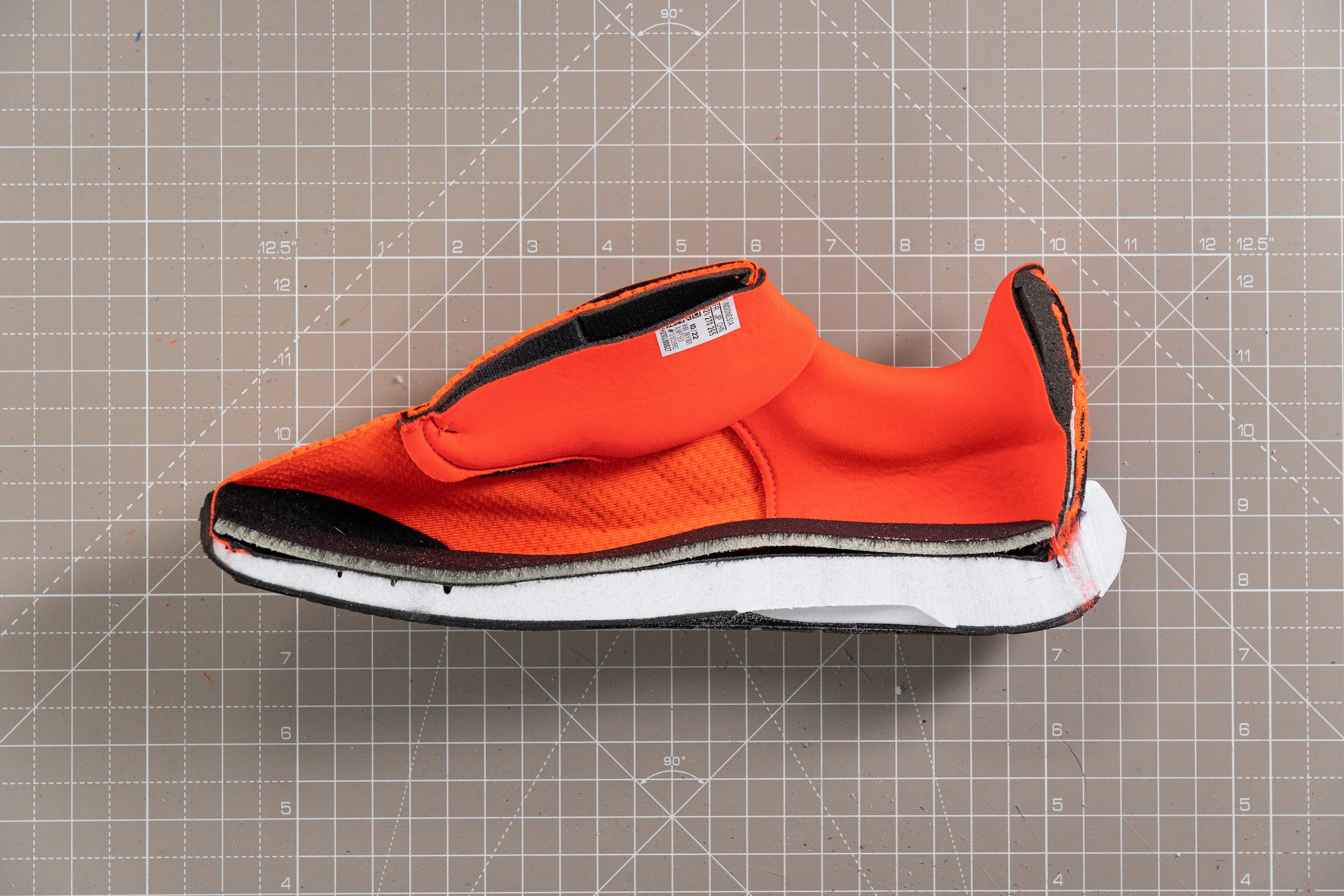
| Runfalcon 3 | 13.6 mm |
| Average | 8.6 mm |
Midsole softness
Adidas incorporates a foam known as Cloudfoam in their shoes. This EVA-based midsole, originally used in insoles for comfort by the German brand, now features in some of their running shoes too.
We recorded its softness at 24.3 HA. This figure corresponds to a balanced feel when you're running, which is pretty standard for entry-level running shoes like these. Not soft at all, yet not firm like a brick.
| Runfalcon 3 | 24.3 HA |
| Average | 20.4 HA |
Size and fit
Size
Adidas Runfalcon 3 fits true to size (318 votes).
Internal length
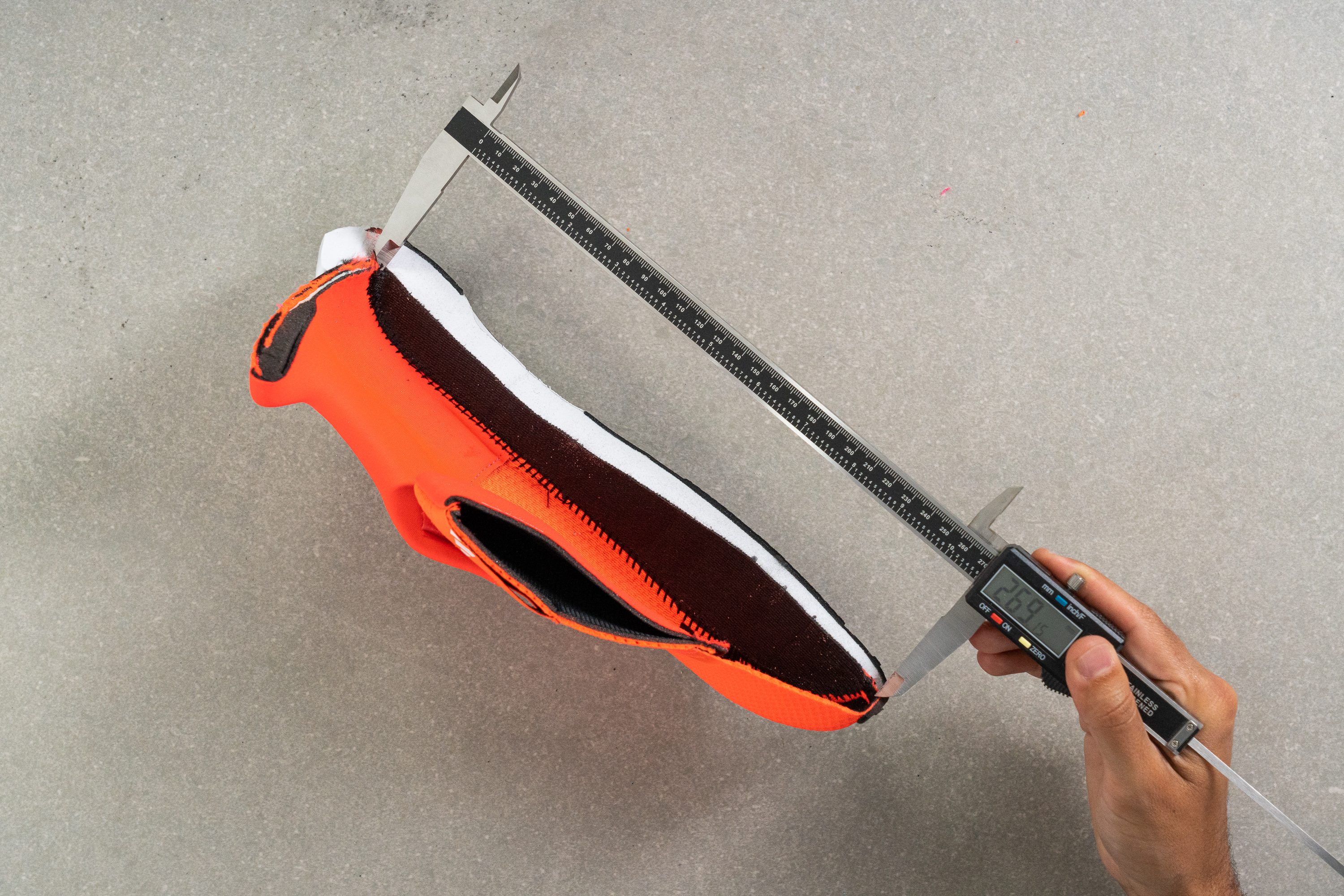
| Runfalcon 3 | 269.2 mm |
| Average | 269.4 mm |
Width / Fit
The Runfalcon's third edition continues to be a superb choice for us runners with wider feet, as we measured the widest part of the upper at 100.4 mm.
Those with narrower feet might consider a more fitting budget shoe, such as the ASICS Gel Excite 9.
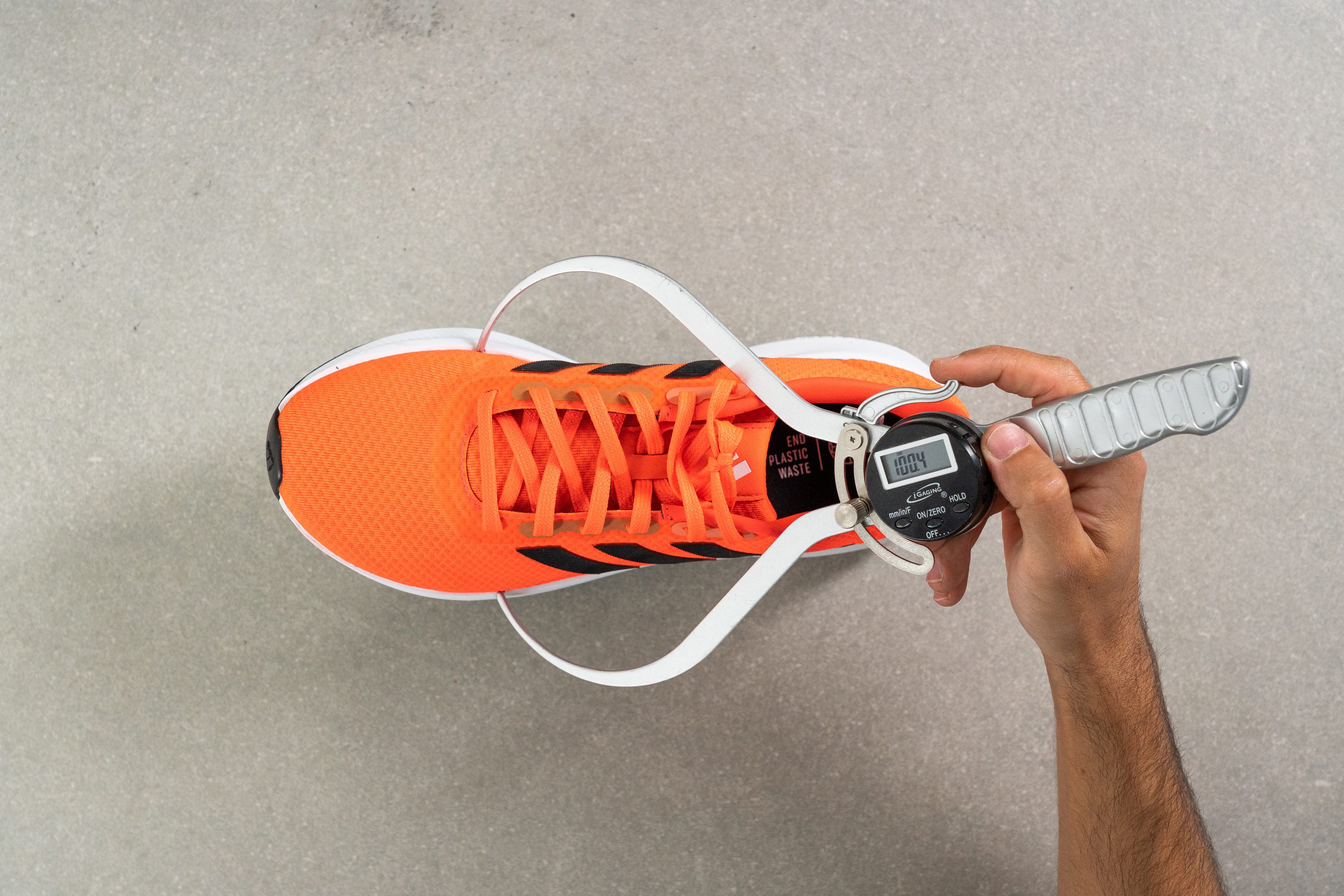
This test follows an older methodology, which is why you don't see recently tested shoes in the chart. Results from different methodologies can not be compared.
| Runfalcon 3 | 100.4 mm |
| Average | 98.5 mm |
Toebox width
Measuring at 80.4 mm in the big toe area, the Runfalcon 3 has ample room to let all toes wiggle, regardless of the foot shape. In fact, it's one of the widest shoes we have ever measured in that area.
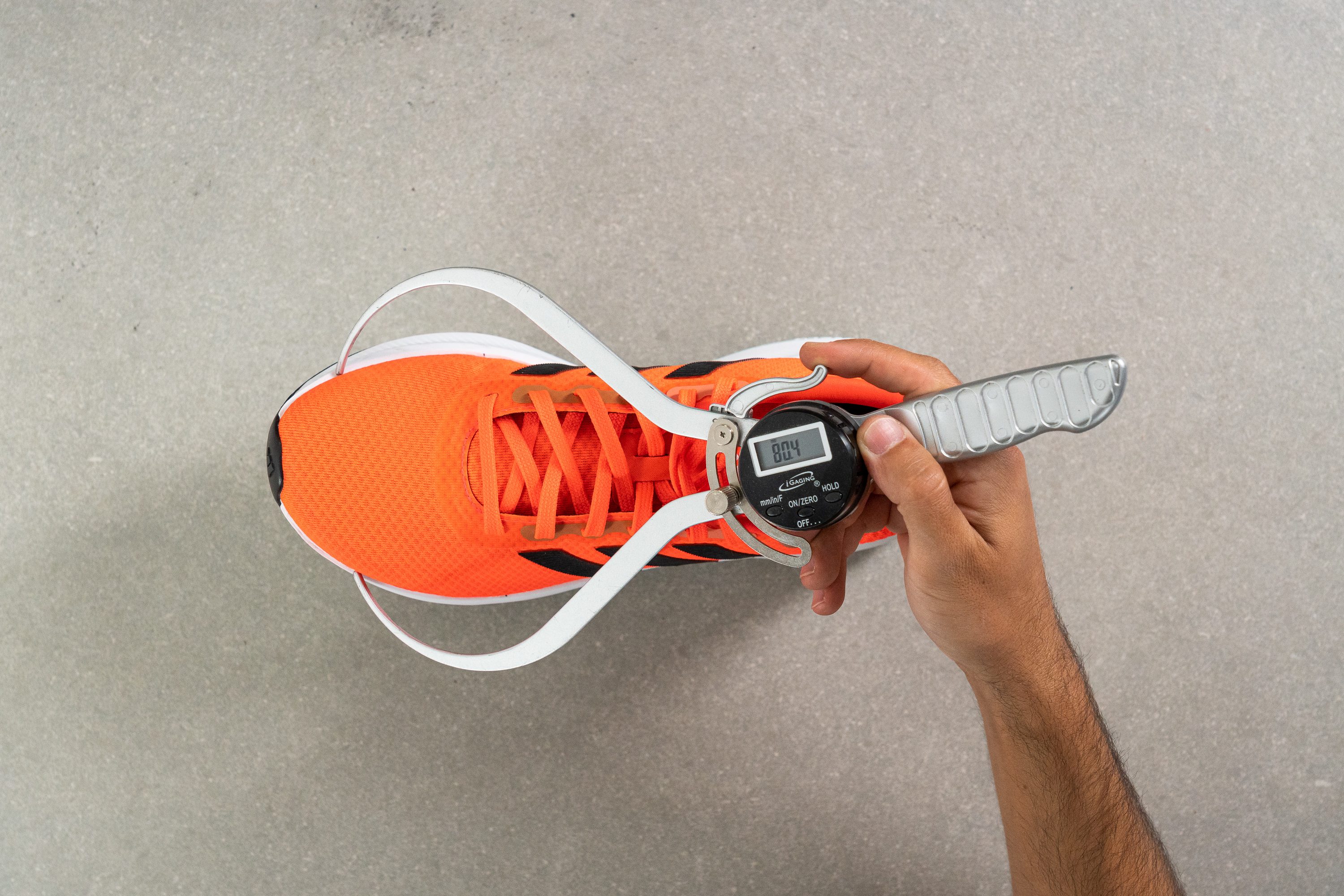
This test follows an older methodology, which is why you don't see recently tested shoes in the chart. Results from different methodologies can not be compared.
| Runfalcon 3 | 80.4 mm |
| Average | 78.4 mm |
Flexibility / Stiffness
We found that we only needed a mere 17.7N of force to bend the Runfalcon 3 to 90 degrees.
This categorizes it as one of the most flexible shoes we've ever put to the test, shedding light on why it's so comfortable for walking or hitting the gym.
This test follows an older methodology, which is why you don't see recently tested shoes in the chart. Results from different methodologies can not be compared.
| Runfalcon 3 | 17.7N |
| Average | 28.1N |
Stiffness in cold (%)
Following a 20-minute freeze session, the shoe disappointingly stiffened up.
The necessary force to bend it to the same degree jumped up to 26.8N, a noticeable increase that we can't overlook.
This represents a 51.8% increase, which falls short when compared to the average.
| Runfalcon 3 | 52% |
| Average | 33% |
Weight
Weight isn't a top priority for brands when it comes to budget-friendly running shoes. This is evident in Adidas' approach with the Runfalcon 3.
Weighing in at 10.0 oz or 283g, it's heavier than both its predecessors—the original Runfalcon and the Runfalcon 2.0—and it even surpasses the weight of an average running shoe.
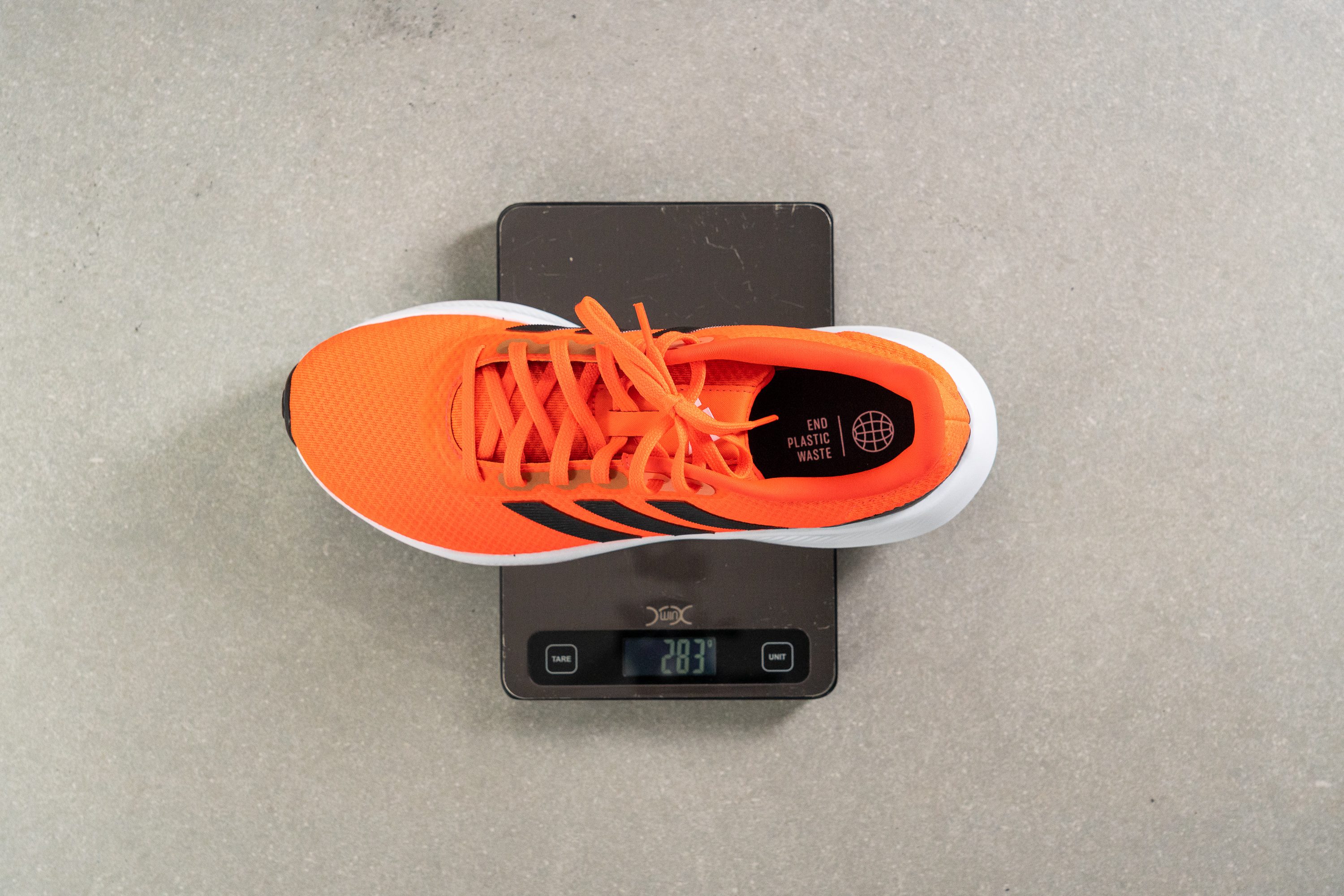
| Runfalcon 3 | 10.0 oz (283g) |
| Average | 9.3 oz (264g) |
Breathability
At first glance, we initially felt that this shoe wouldn't boast out-of-this-world breathability, though it seemed a slight improvement over its predecessors.
Following our smoke test in the lab, we assigned it a 3 out of 5 rating. And we noticed that a funny pattern emerged: the original Runfalcon scored a 1/5, the Runfalcon 2.0 scored a 2/5, and now the Runfalcon 3 a... 3/5! We eagerly urge Adidas to aim for a 4 with the next version.
On closer inspection, the engineered mesh Adidas employed here felt dense. But when we shined a light on the shoe—an incredibly simple but telling test—numerous ventilation holes became visible. This is how Adidas managed to improve breathability from the two previous models.
Nevertheless, these aren't your typical full perforations often found in today's running shoes, leading to somewhat limited breathability.
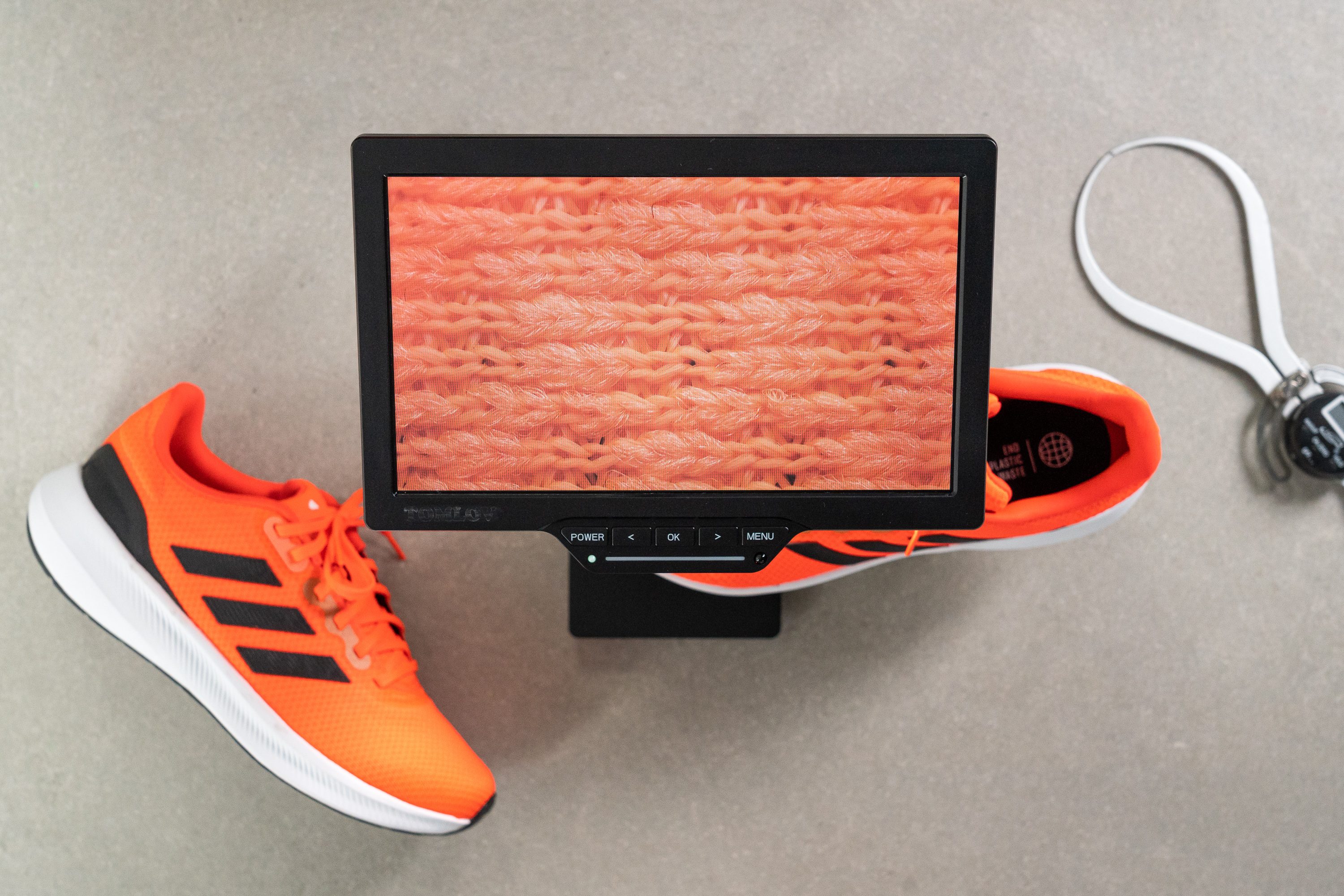
And our revealing microscope test disappointingly confirmed why this shoe doesn't offer the breathability we had hoped for. This is a thick-and-dense mesh!
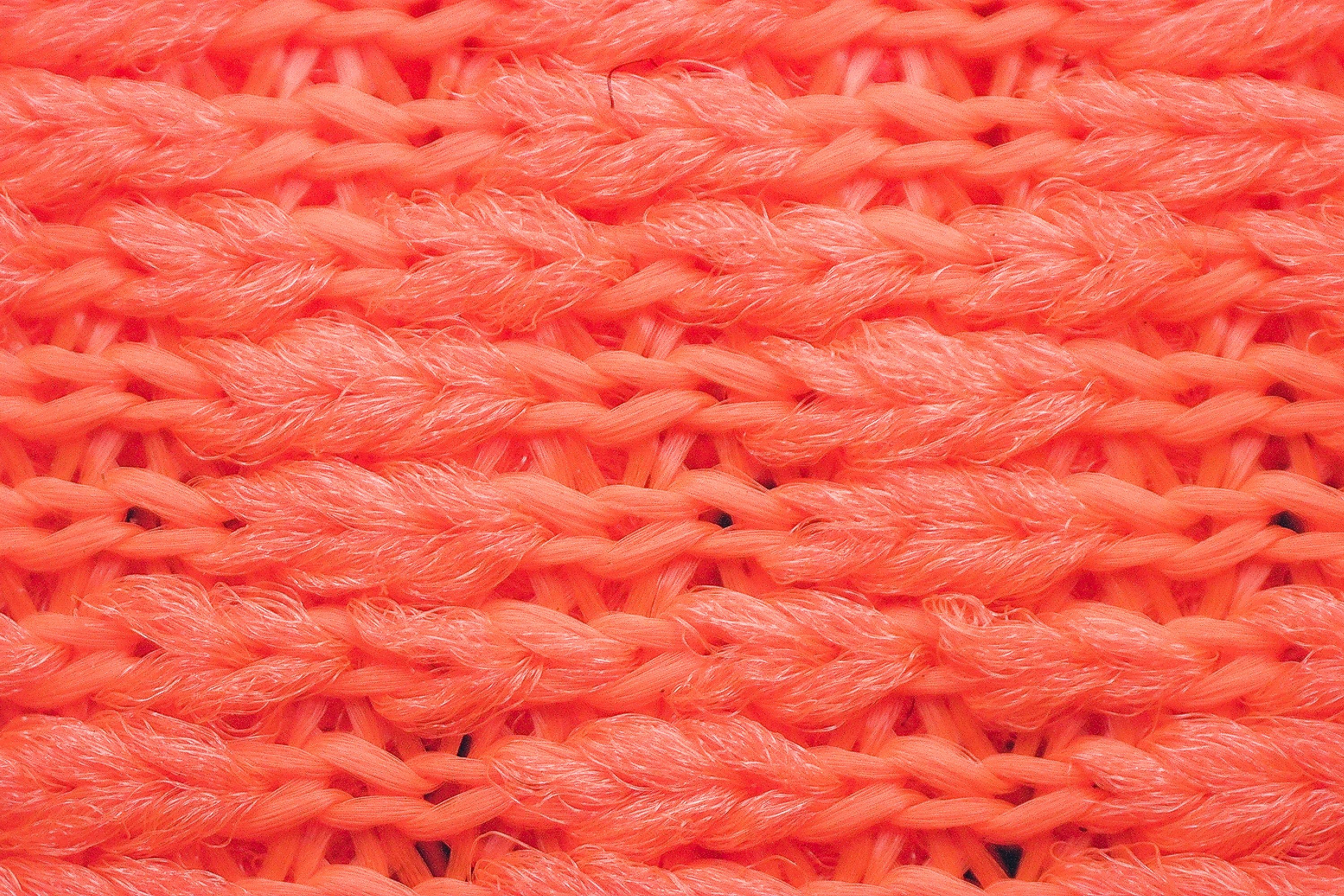
For example, if we contrast this picture with the incredibly breathable mesh from the Adidas Boston 11, we clearly see an astounding difference. Now it's really easy to understand why this shoe is not very breathable.
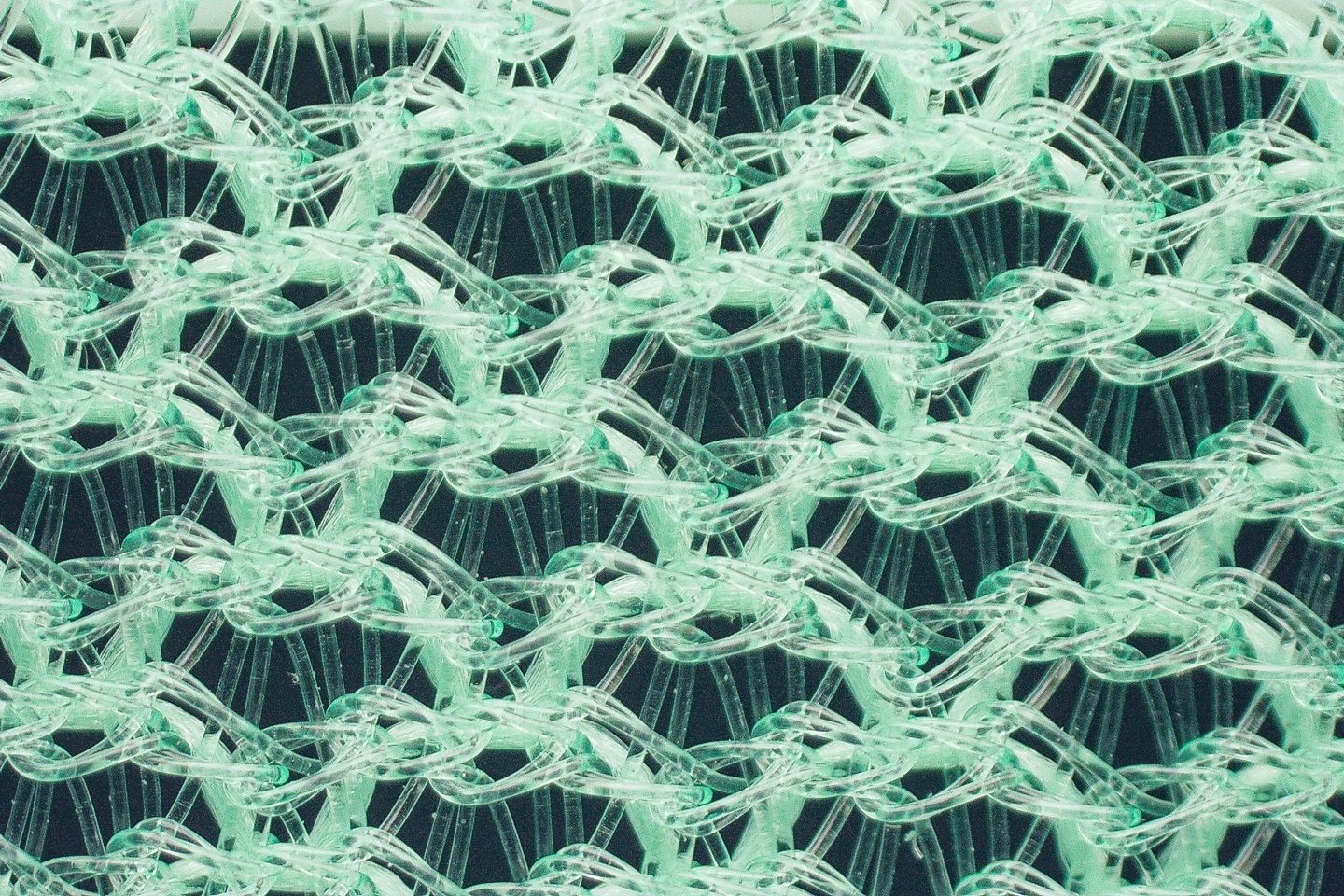
| Runfalcon 3 | 3 |
| Average | 3.7 |
Stability
Lateral stability test
Stability is a sure thing with the Runfalcon 3. As we've mentioned earlier, this shoe is tailor-made for heel strikers. So it's crucial to have a secure landing zone in the heel, and the Runfalcon 3 doesn't disappoint.
And a helpful feature here is the piece of TPU plastic that surrounds the heel, significantly enhancing the shoe's stability.
Torsional rigidity
Typically, the torsional rigidity test yields scores of 1 or 2 for daily trainers. However, this time, we gave the shoe a 3 out of 5.
We consider it to have moderate flexibility, although not quite as much as the average daily trainer.
| Runfalcon 3 | 3 |
| Average | 3.5 |
Heel counter stiffness
Adidas has opted for a safe approach with the heel counter, which we assigned a stiffness rating of 2 out of 5, slightly below the average.
It's comfortably soft and generously padded, providing ample support for the Achilles tendon.
| Runfalcon 3 | 2 |
| Average | 2.9 |
Midsole width - forefoot
We found the forefoot to be 114.0 mm wide with our caliper, providing ample space for secure landings.
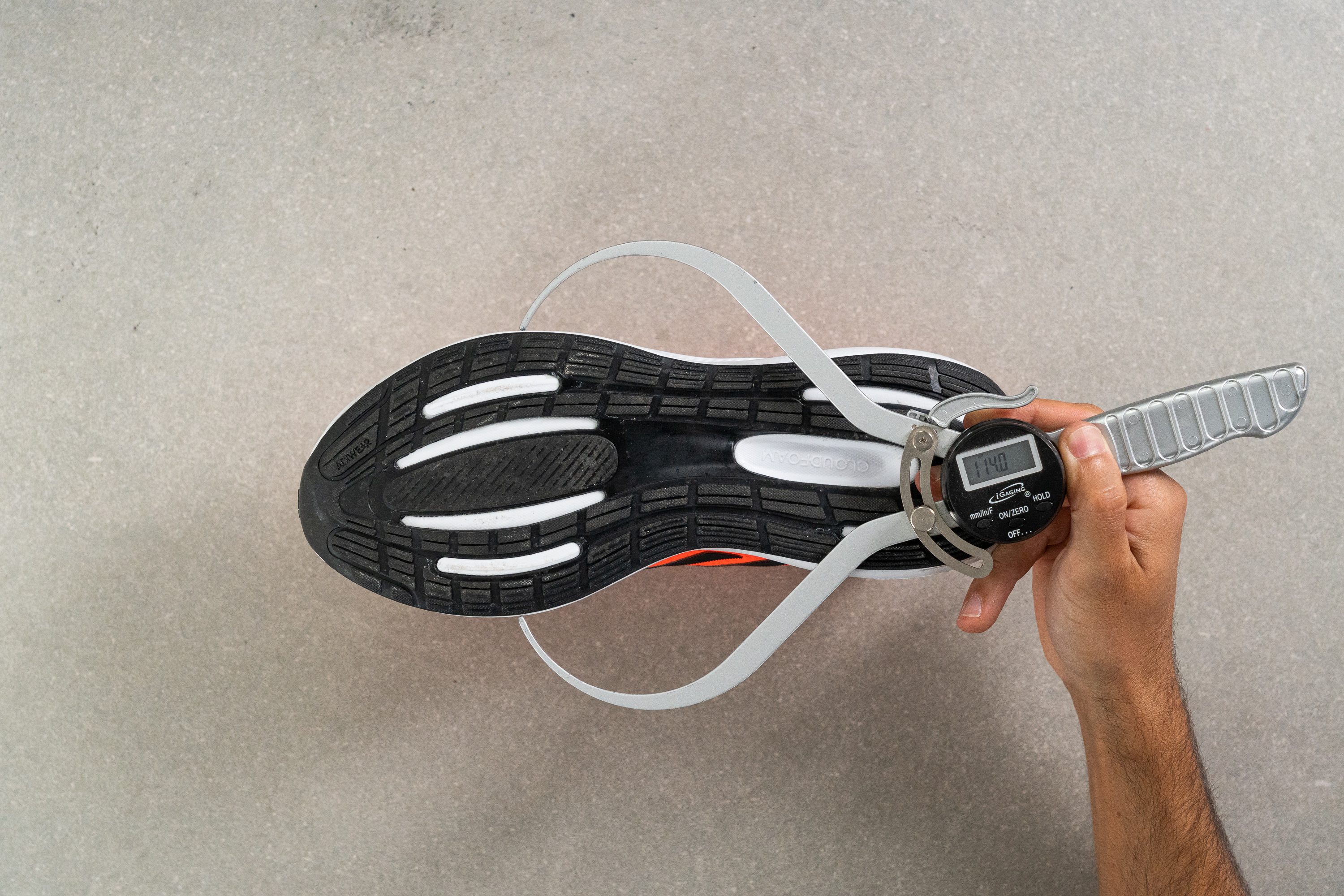
| Runfalcon 3 | 114.0 mm |
| Average | 114.4 mm |
Midsole width - heel
However, once again, it's the heel where Adidas really shines with this shoe.
With an impressive width of 94.8 mm, it stands out as significantly wider than the average running shoe, as well as both preceding versions of the Runfalcon.
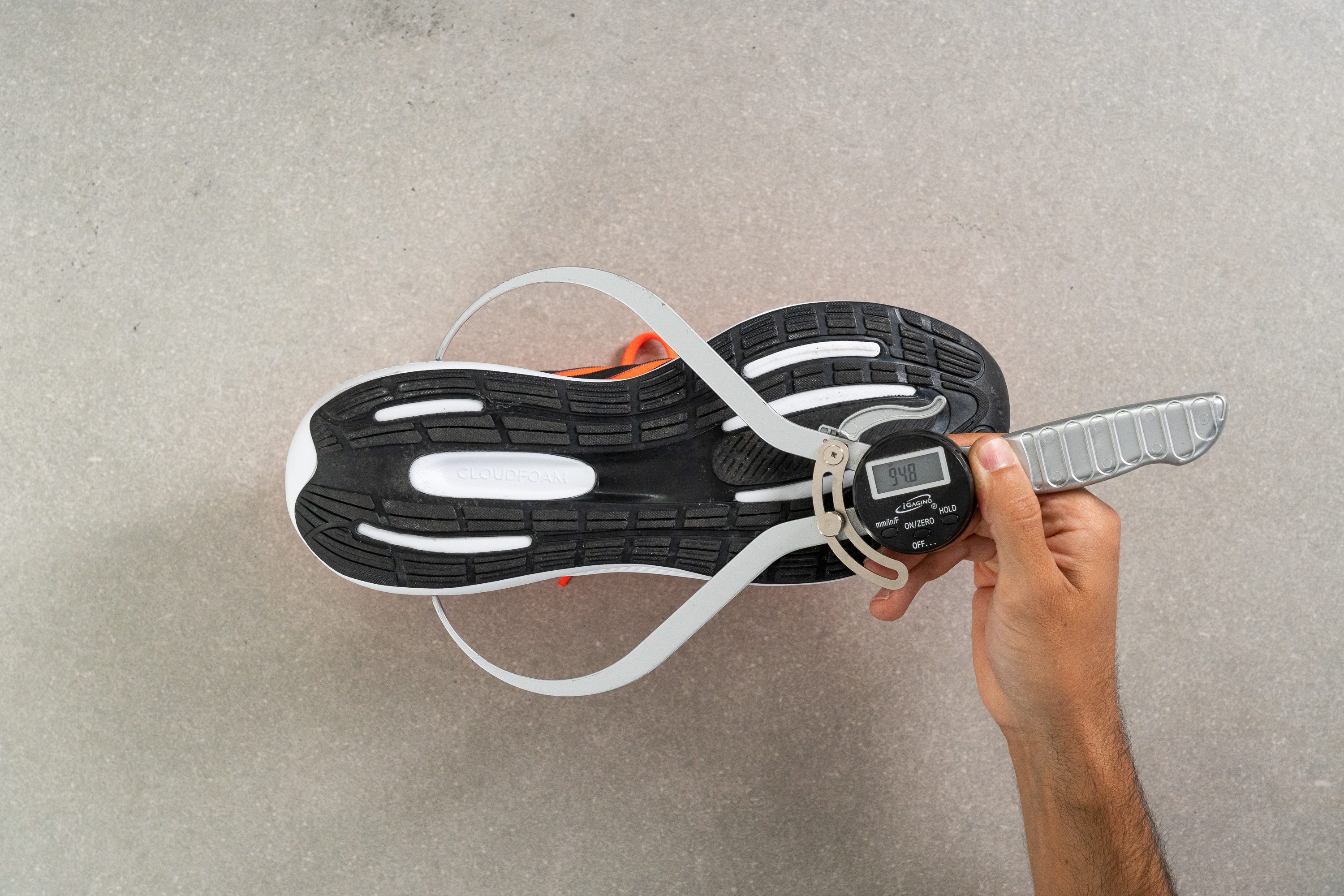
| Runfalcon 3 | 94.8 mm |
| Average | 90.6 mm |
Durability
Toebox durability
While breathability offers a run-of-the-mill performance, here's where the shoe really falls short.
While we fully understand that cost-effective shoes can't boast the latest foam technologies or 3D-printed components, there's no justification for Adidas to produce a daily trainer with such poor durability.
The outcome of our Dremel test, in which we exert the same 3.2N of force on every shoe, is genuinely disappointing. The mesh Adidas chose to use didn't stand a chance against the Dremel—it gave way almost instantaneously, and we had no choice but to gave the Runfalcon 3 a 1/5.
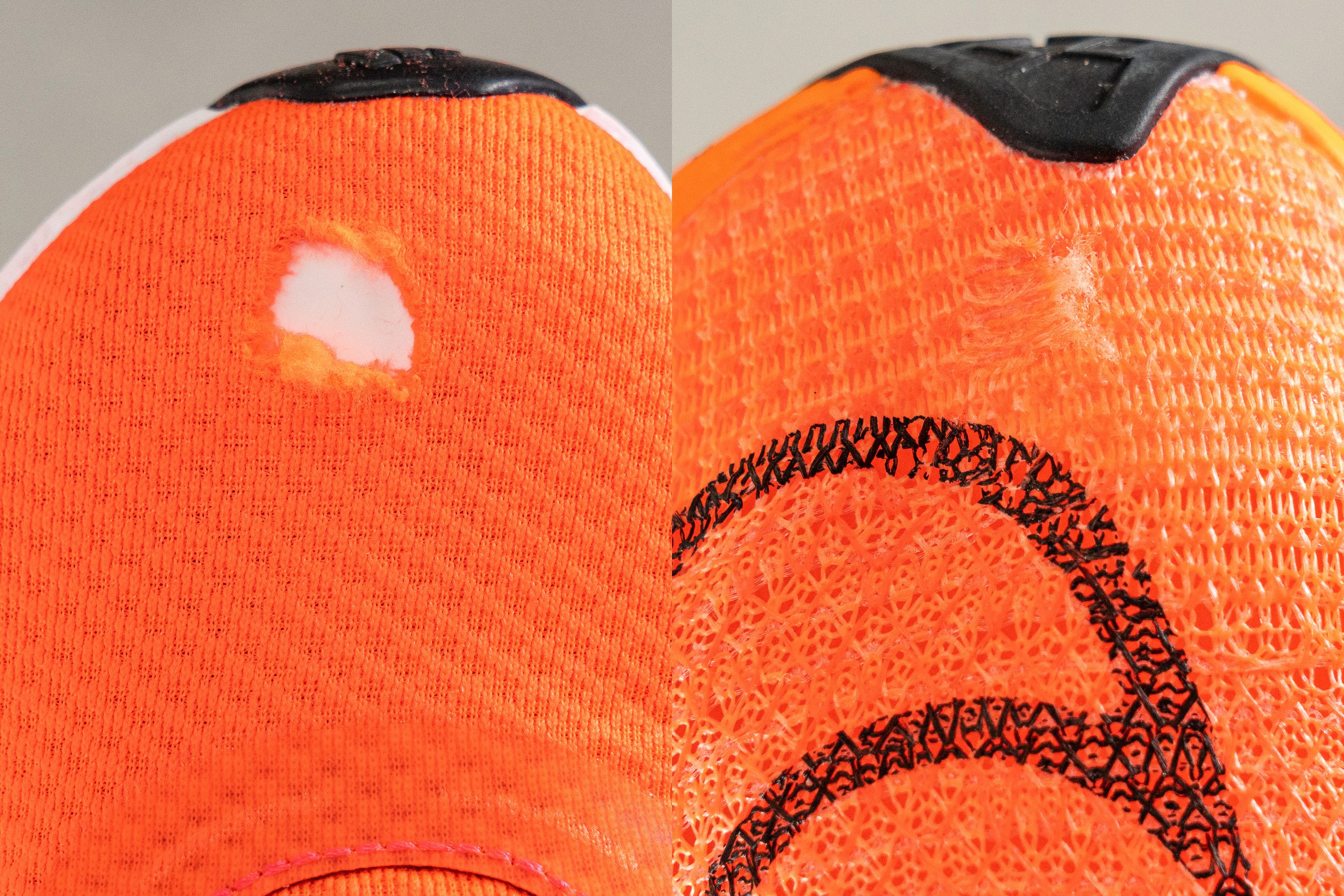
| Runfalcon 3 | 1 |
| Average | 2.6 |
Heel padding durability
We were already expecting the heel to perform poorly since the material is largely the same. Nevertheless, we still had to conduct our Dremel test, holding on to a shred of optimism.
Regrettably, the outcome is once again a disheartening 1/5. The result, when compared with the ASICS Metaspeed Sky+, is evident.
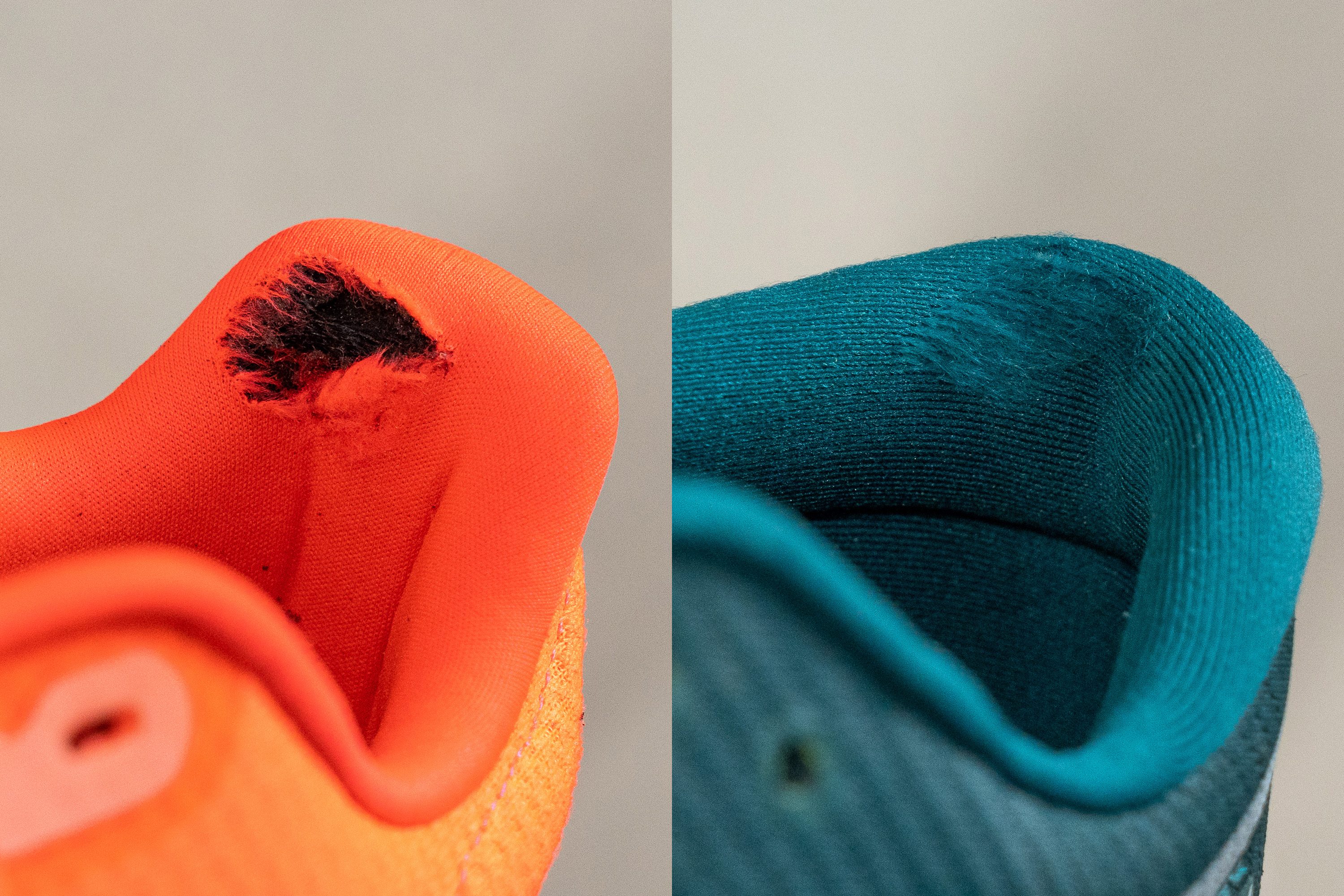
| Runfalcon 3 | 1 |
| Average | 3.4 |
Outsole hardness
With a hardness of 81.9 HC, Adidas didn't take any risks with the outsole.
This number obtained with our durometer tests suggest this will give us a solid balance of durability and grip.
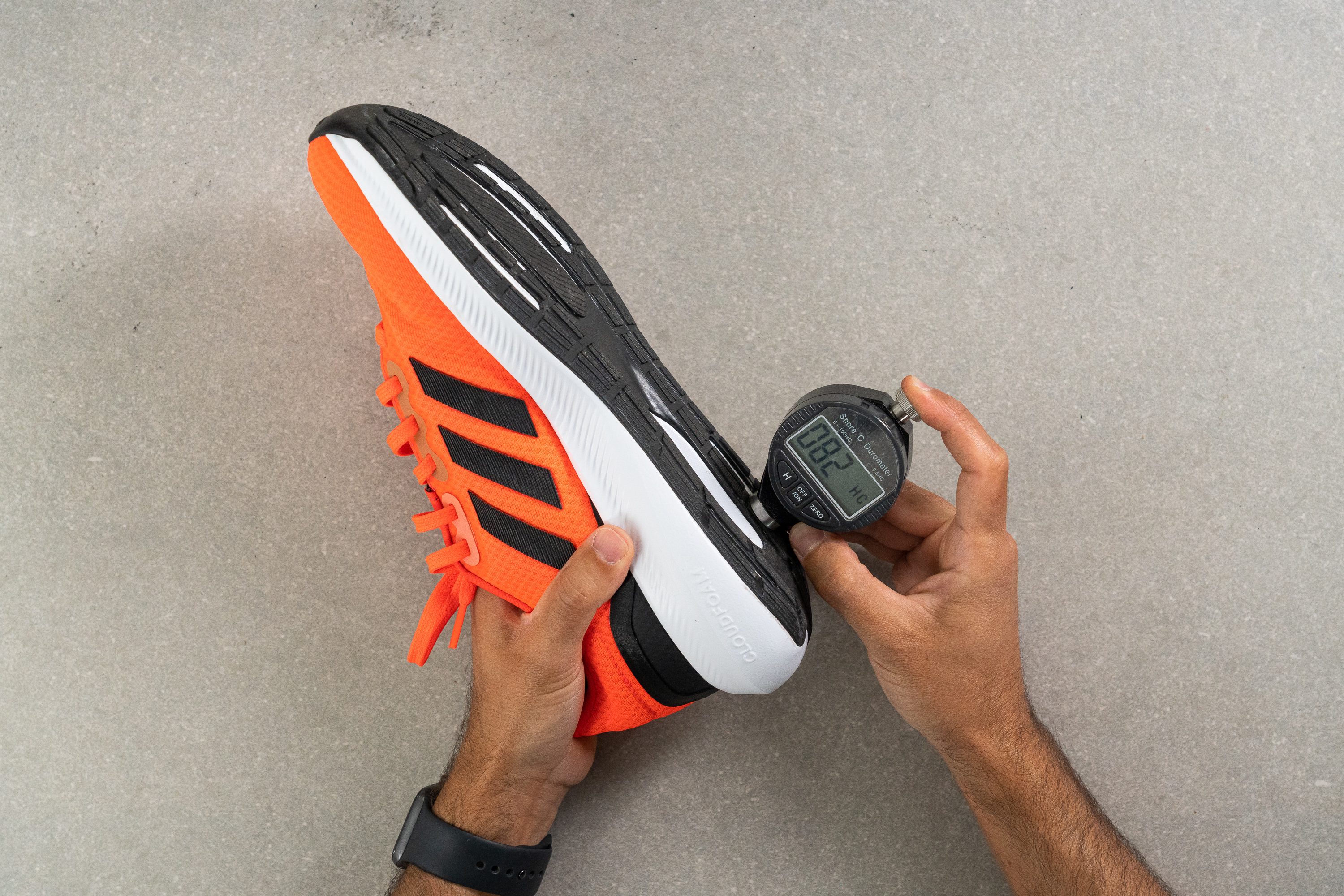
| Runfalcon 3 | 81.9 HC |
| Average | 79.2 HC |
Outsole durability
Initially, we feared about running the Dremel on this shoe again. It seemed like we had been easily damaging it all over.
Yet, in a surprising twist, the situation completely flipped in terms of durability. Adidas, known for crafting arguably some of the finest outsoles in the running business, once again confirmed its reputation, although there's no Continental in here.
The Dremel could only create a minor 0.64-mm indentation in the rubber, which is an impressive feat given the rubber's not overly high hardness.
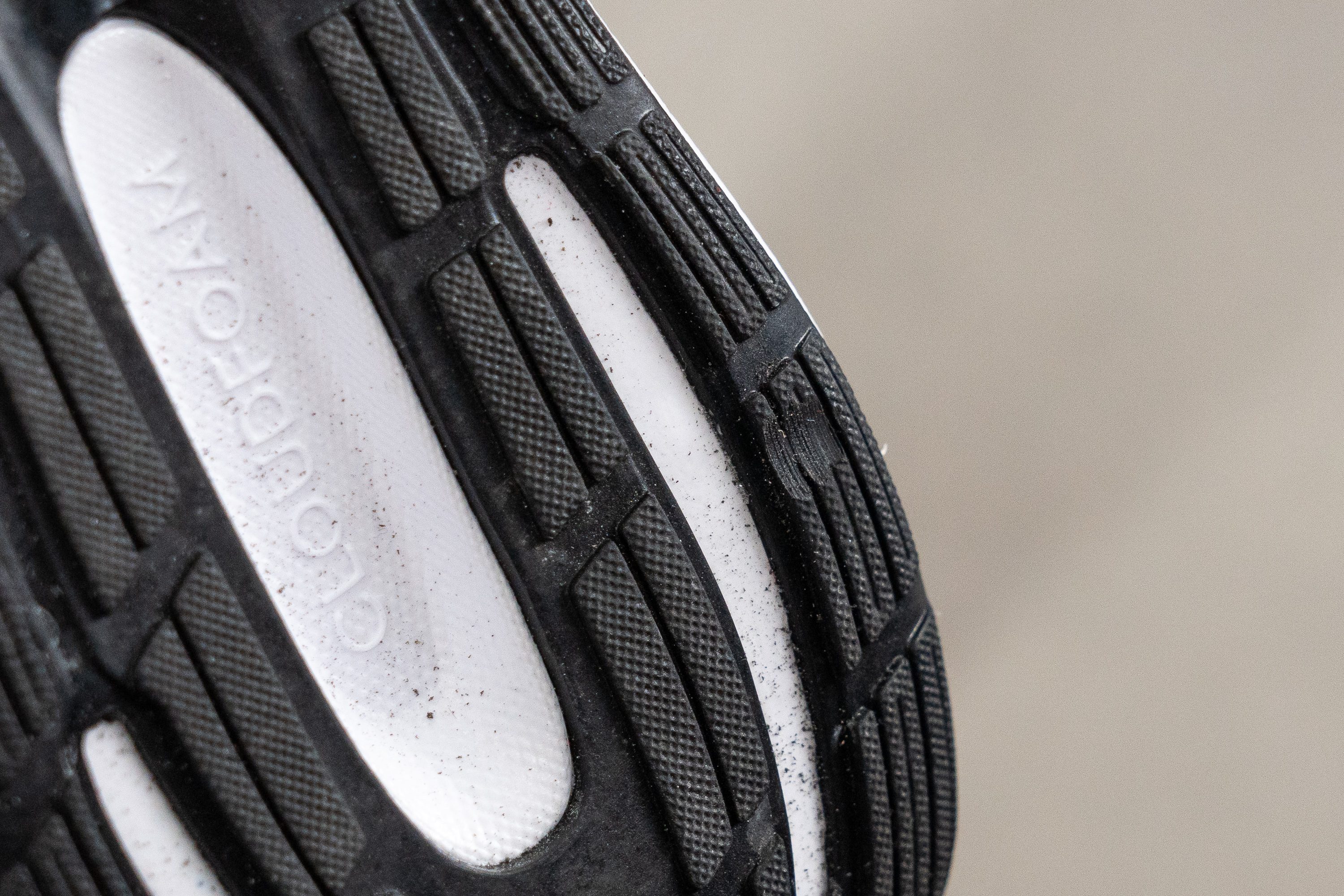
| Runfalcon 3 | 0.6 mm |
| Average | 1.1 mm |
Outsole thickness
The outsole also features several cutouts. These serve to reduce weight and increase flexibility. With a solid layer of rubber around these cutouts, we believe there should be no issues—even on gravel or easy trails.
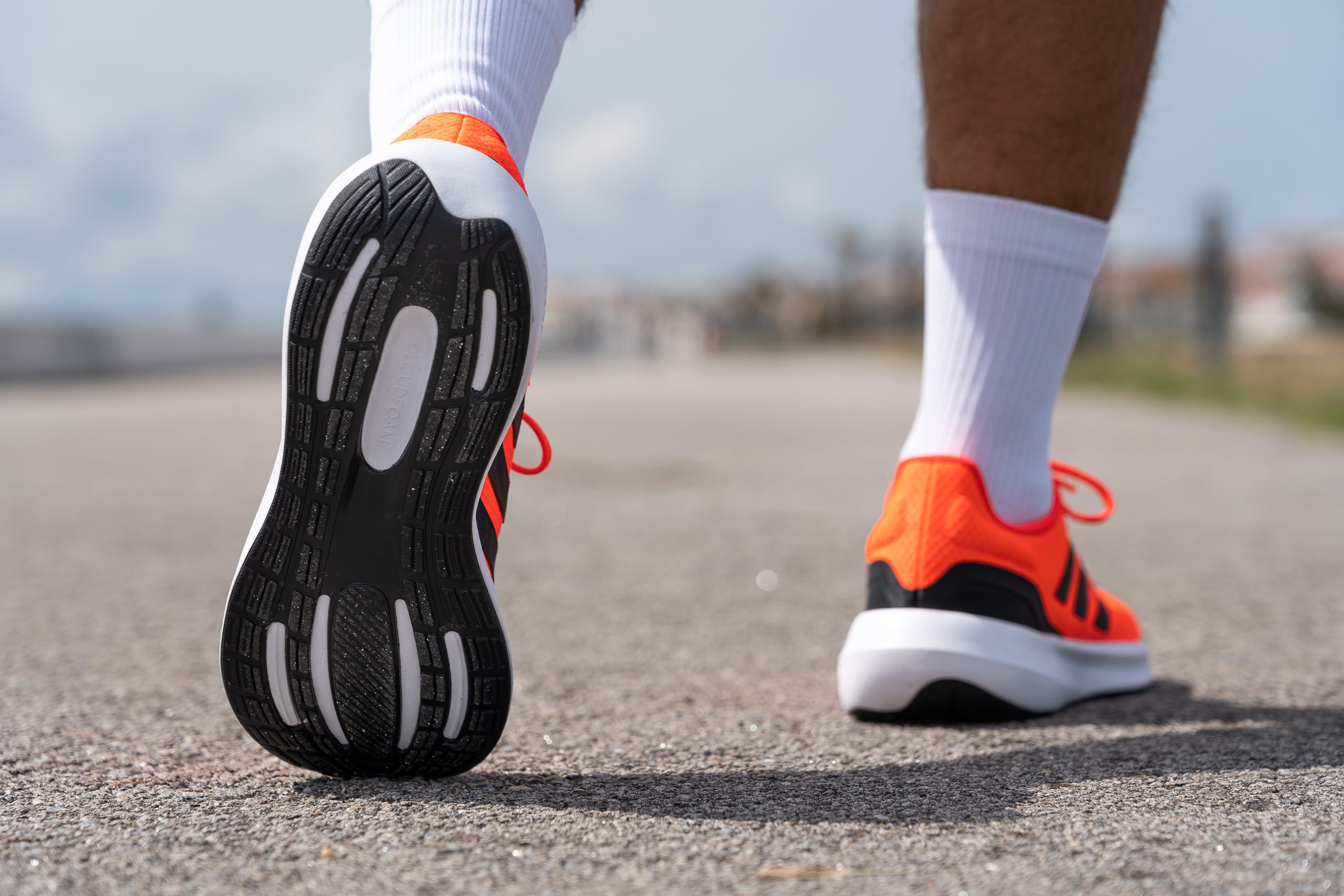
The outsole's thickness is below average—at 3 mm—but it's not an issue considering the remarkable durability we've observed just earlier.
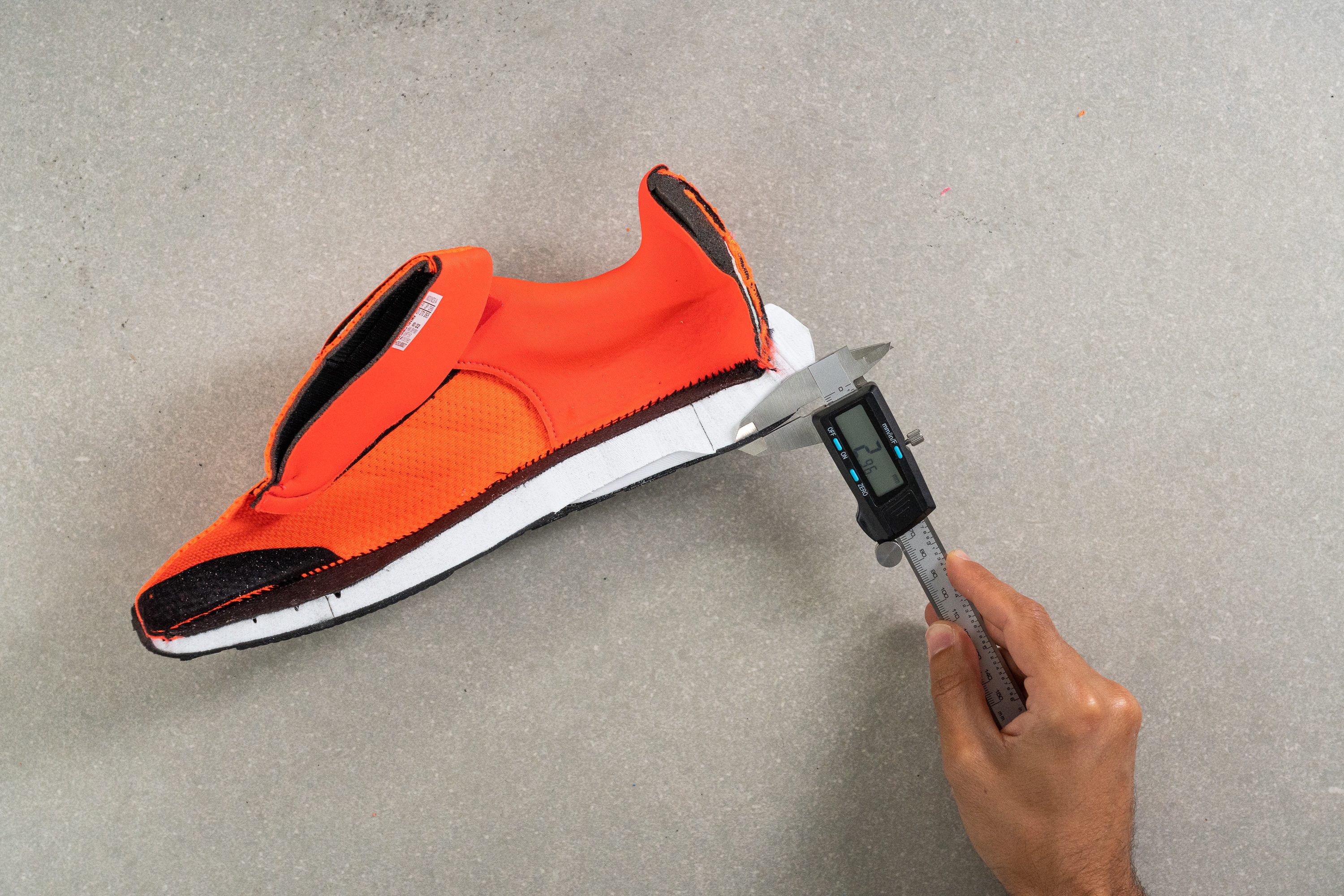
| Runfalcon 3 | 3.0 mm |
| Average | 3.2 mm |
Misc
Insole thickness
The insole thickness holds steady at 3.7 mm, which, while a bit below-average, still matches the previous version. If it's not broken, don't fix it!
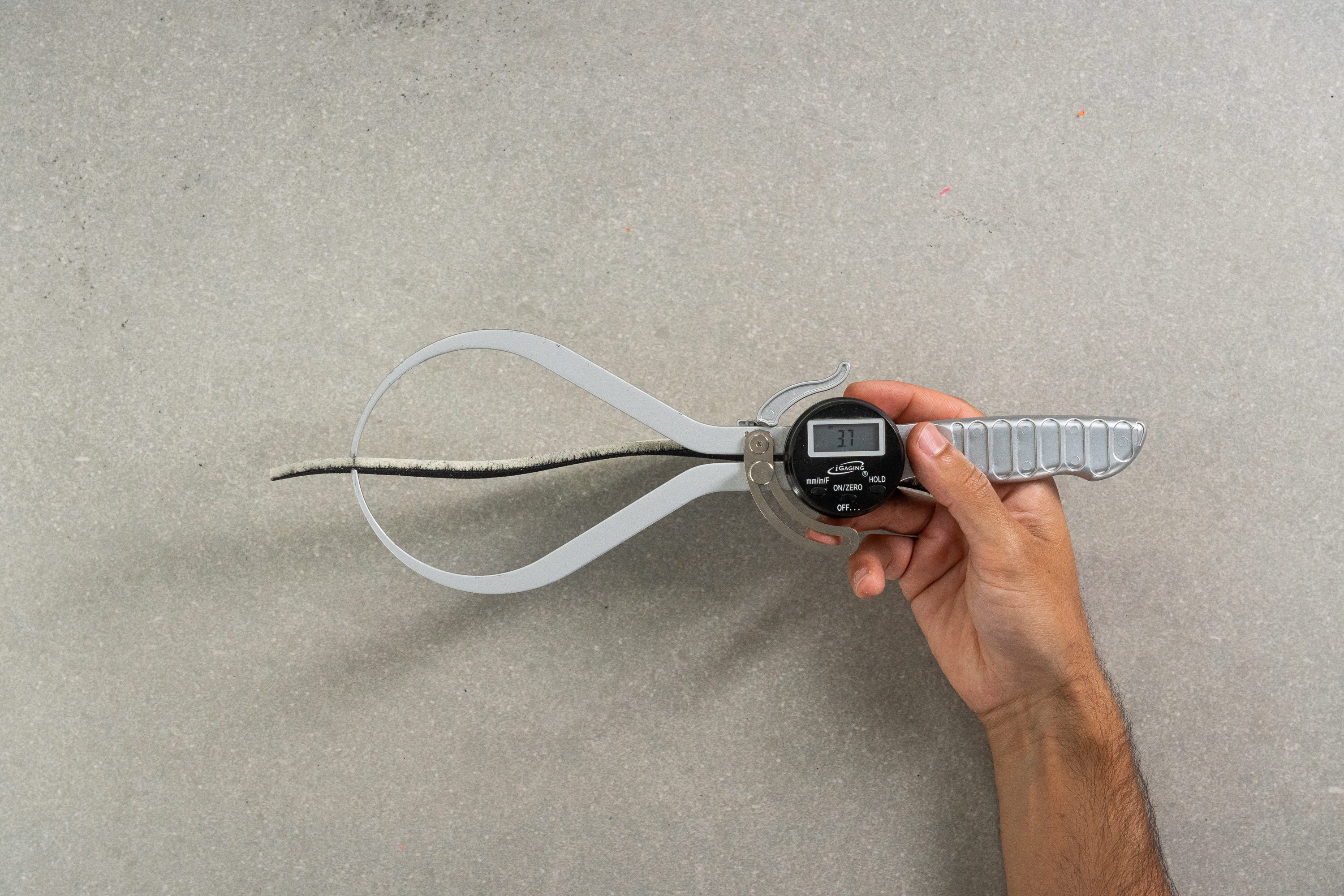
| Runfalcon 3 | 3.7 mm |
| Average | 4.5 mm |
Removable insole
Thanks to its generous width and the absence of a glued insole, the Runfalcon 3 welcomes the exchange of almost any insole. Orthotics fit in perfectly.
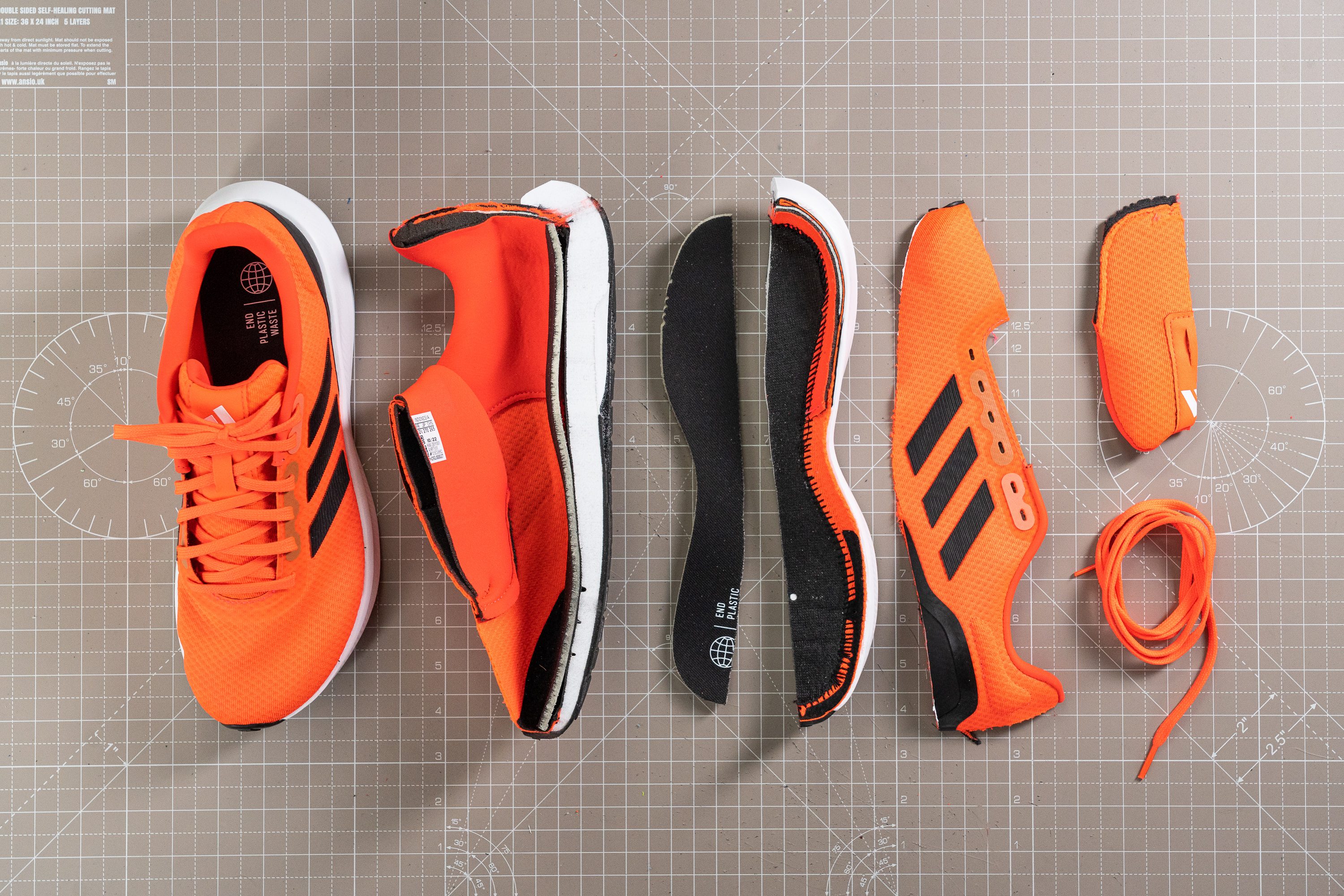
| Runfalcon 3 | Yes |
Midsole softness in cold (%)
When exposed to cold temperatures, the foam hardens to 30.1 HA, shifting from moderately firm to outright firm.
Although this change is less than ideal, it's entirely typical for an EVA-based compound, as we've outlined in our advanced guide about temperatures and midsoles.
Experiencing a 24.2% difference when shifting from room temperature to the freezer, the shoe outperforms not only the average running shoe but also most EVA foams!
While it may not be the absolute best result across the board, it's definitely a standout performance for this kind of midsole.
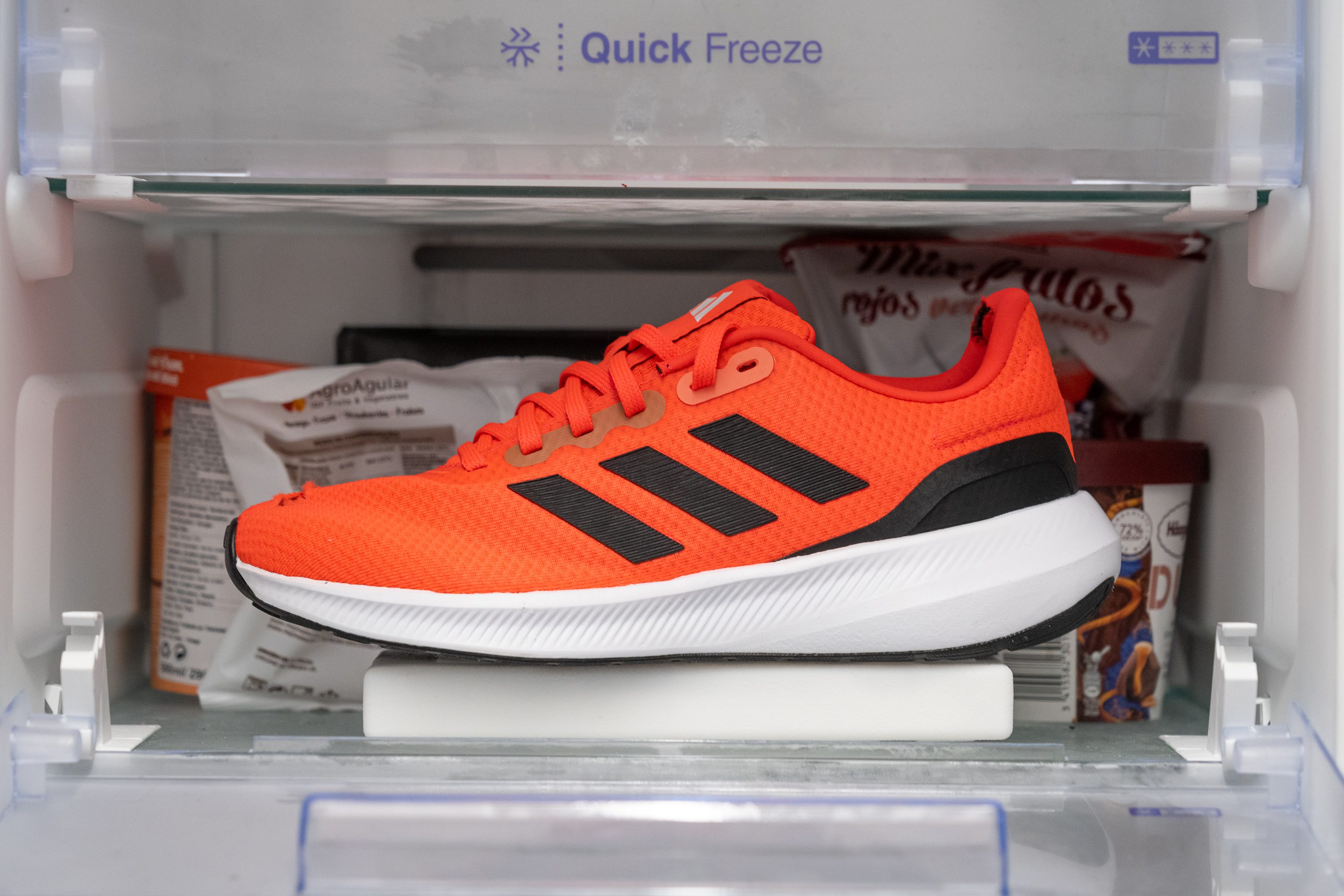
| Runfalcon 3 | 24% |
| Average | 24% |
Reflective elements
Once again, Adidas disappoints us with a shoe lacking in reflective elements, which is certainly a letdown.
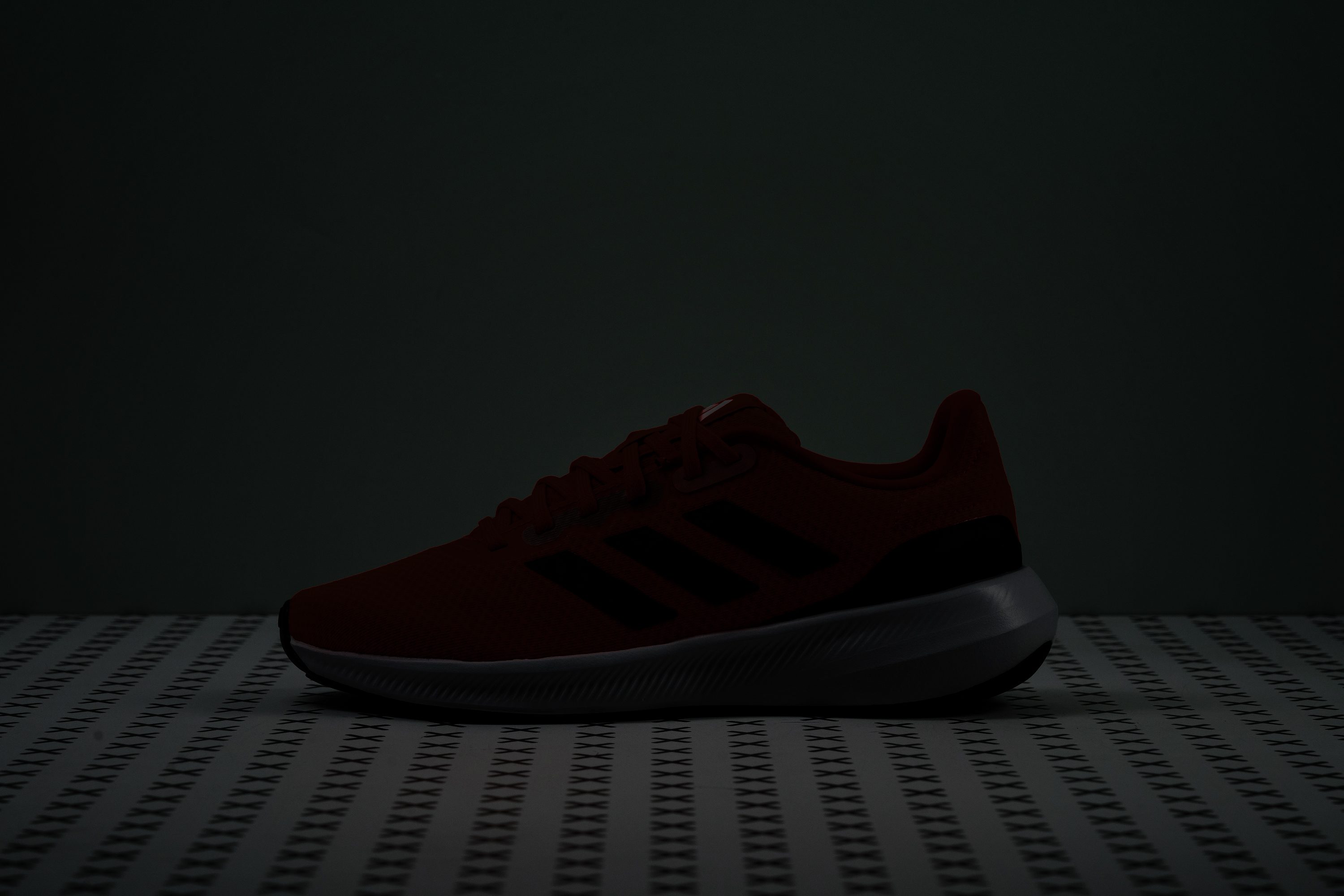
| Runfalcon 3 | No |
Tongue padding
It's rare to find $65 shoes boasting an 8-mm thick tongue. This feature ensures superior comfort over the instep, eliminating any possibility of lace bite.
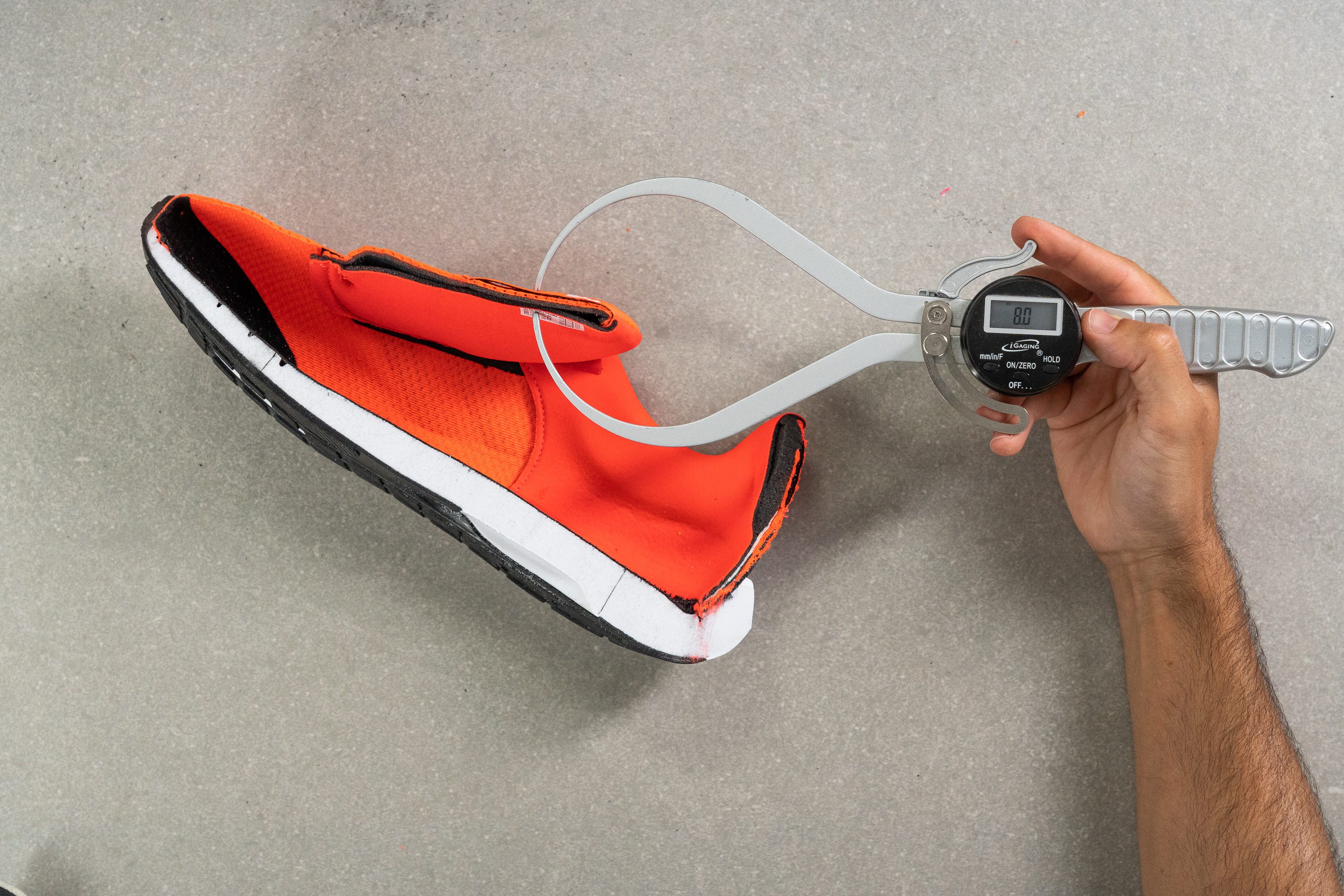
| Runfalcon 3 | 8.0 mm |
| Average | 5.7 mm |
Tongue: gusset type
Budget-friendly running shoes often come with non-gusseted tongues, and that's the case here. On fast runs, a bit of tongue movement is a possibility. However, for easy-to-moderate runs, this shouldn't be an issue.
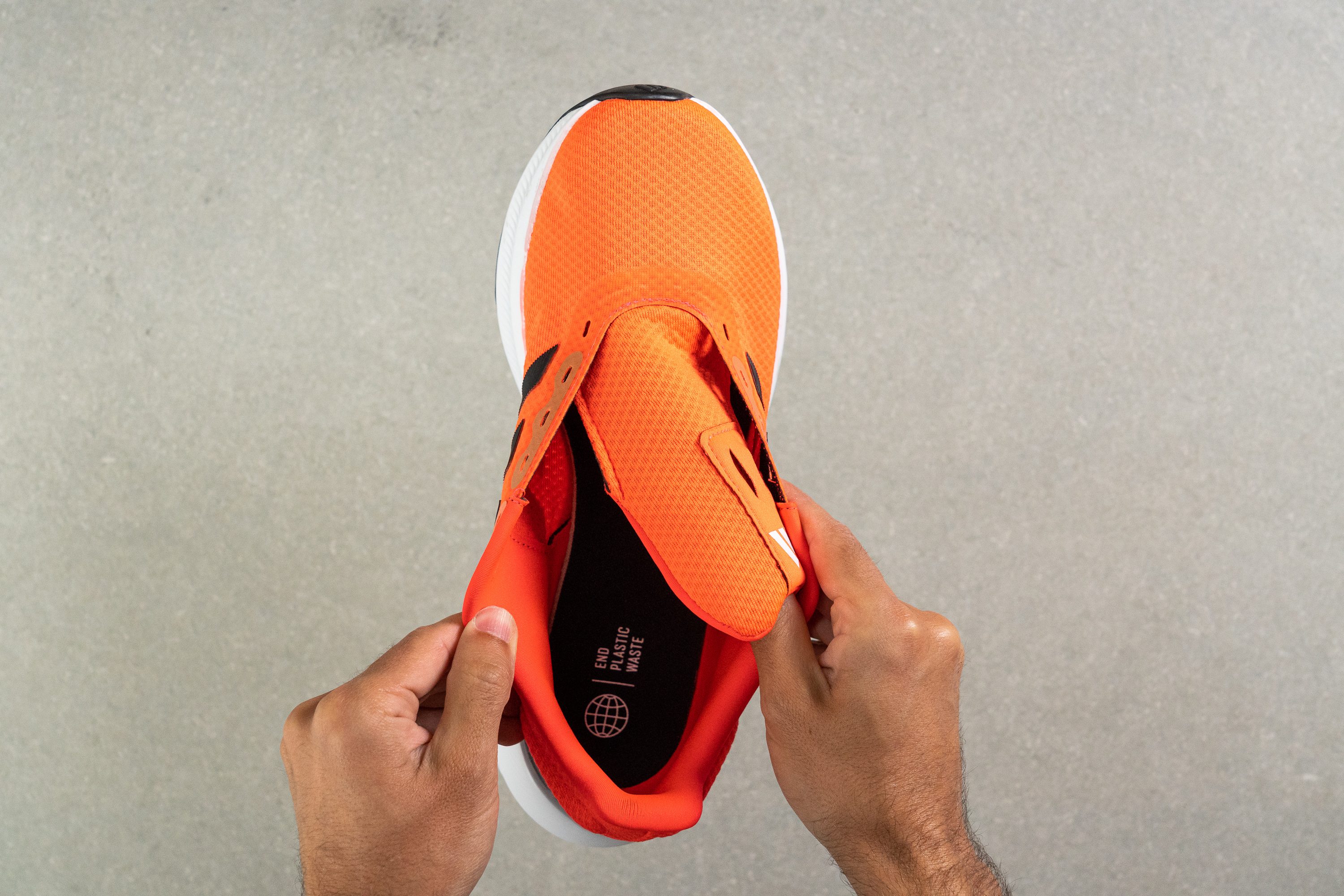
| Runfalcon 3 | None |
Heel tab
There are no loops or tabs to help with the on-and-off, but the heel portion of the shoe's collar is extended, which makes it easier to grab when sliding inside the shoe.
| Runfalcon 3 | Extended heel collar |

